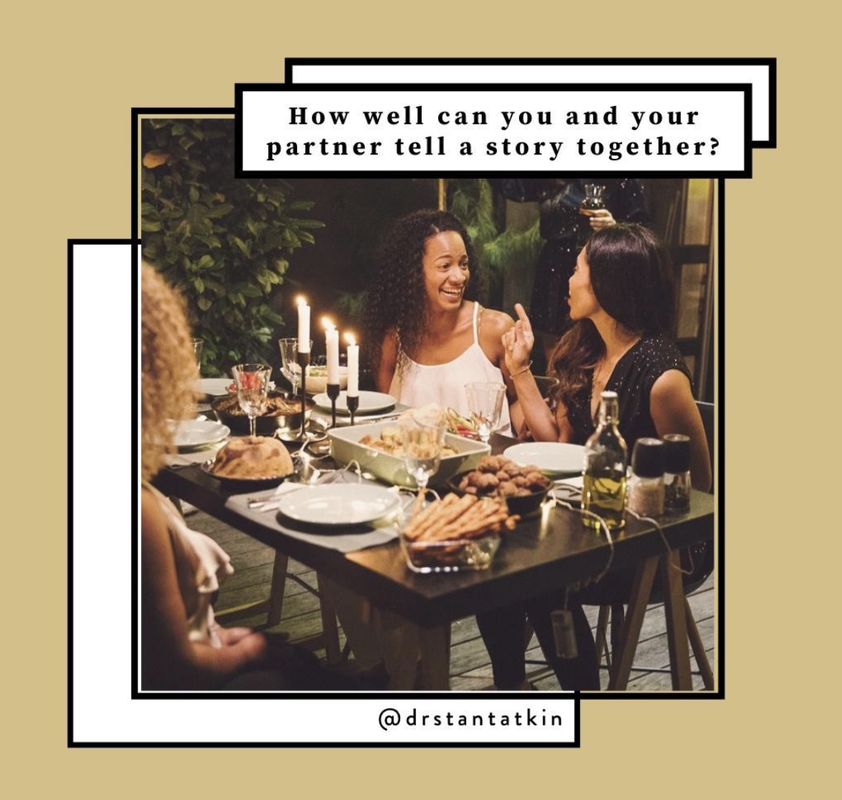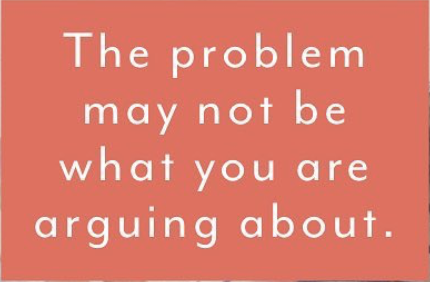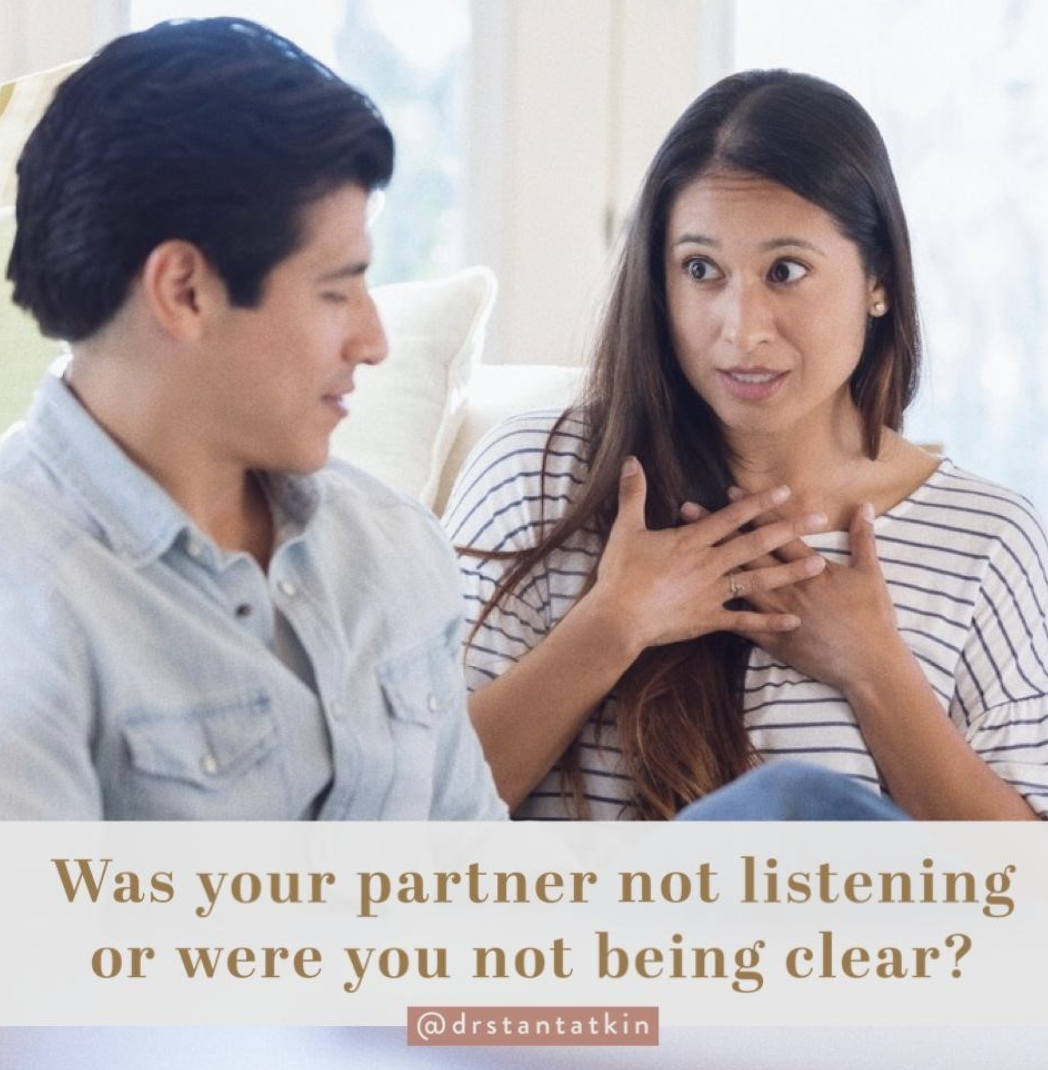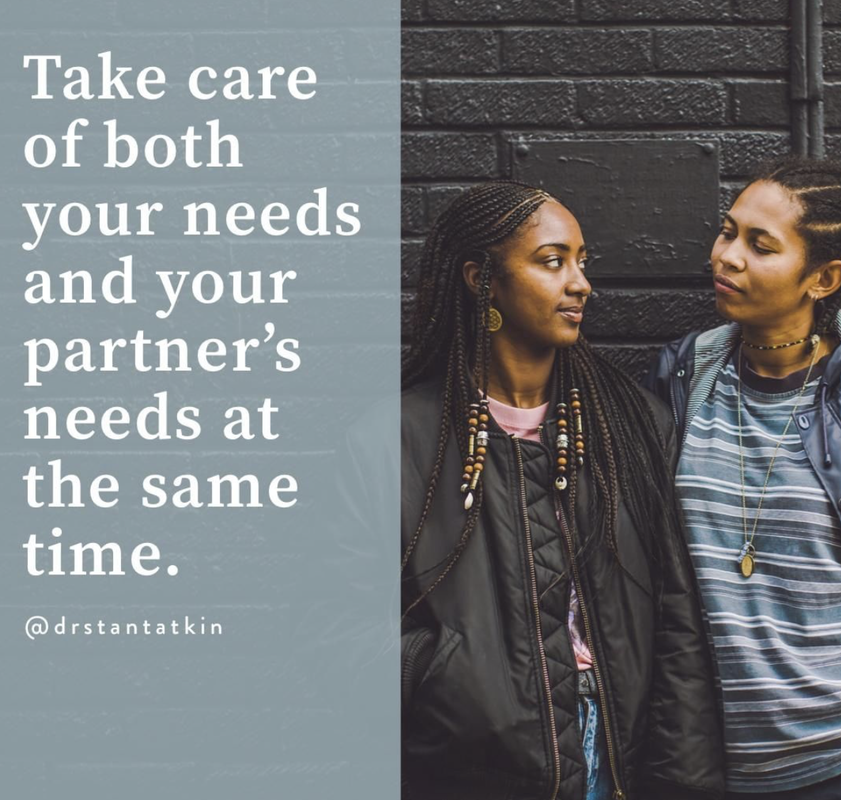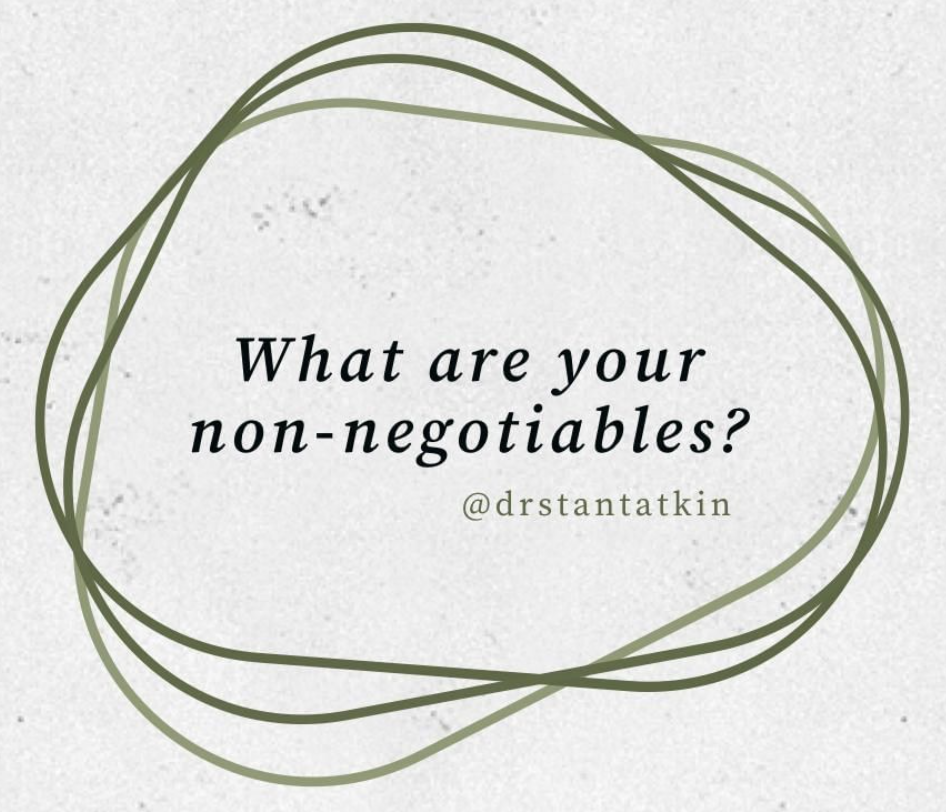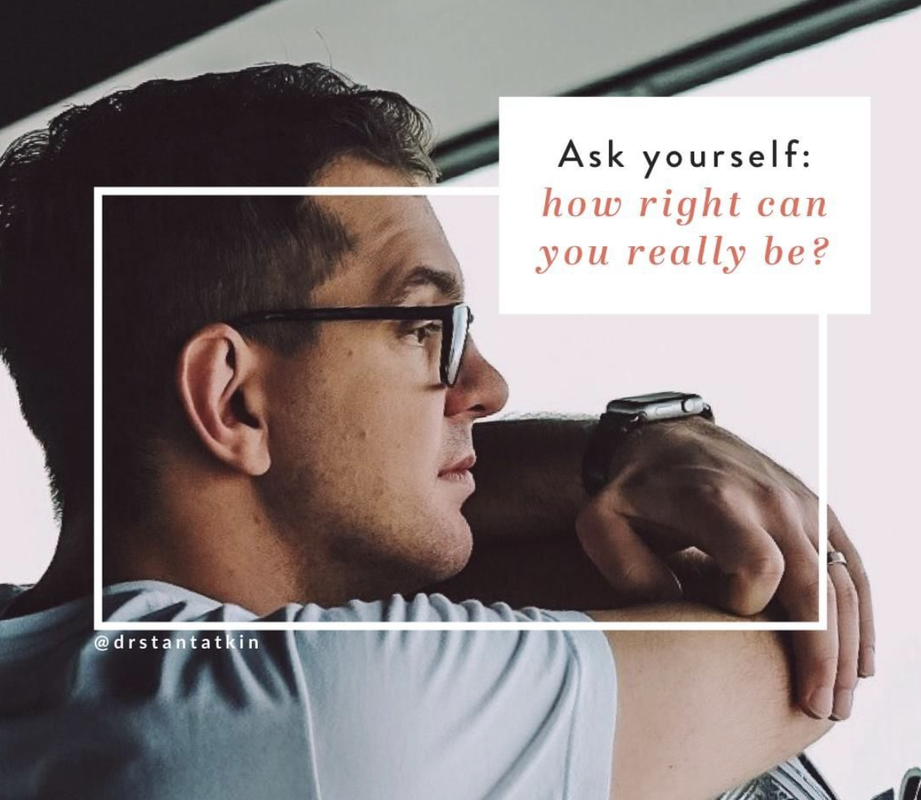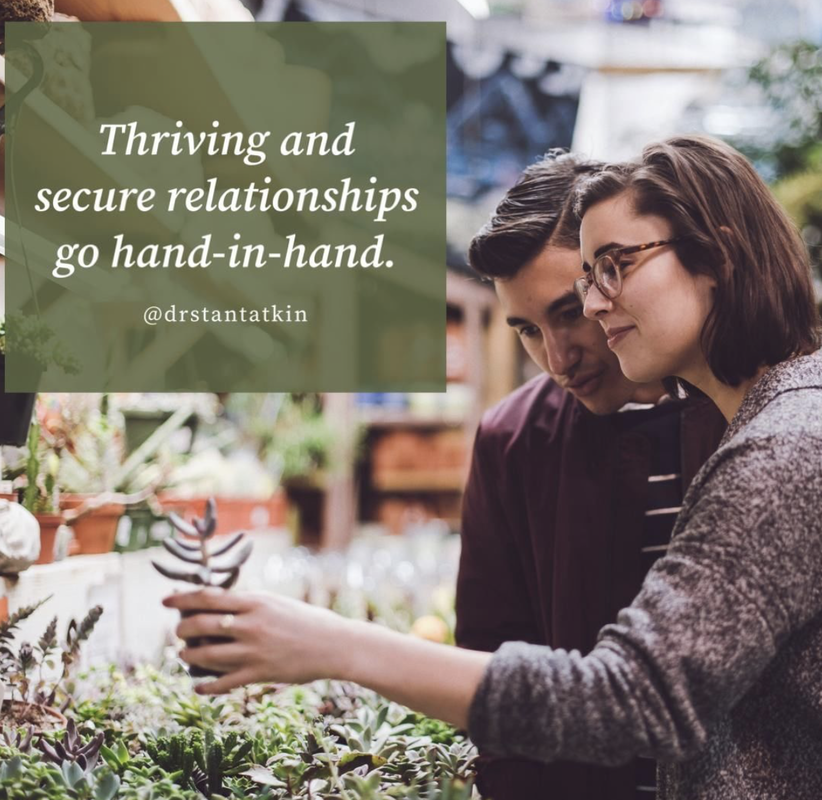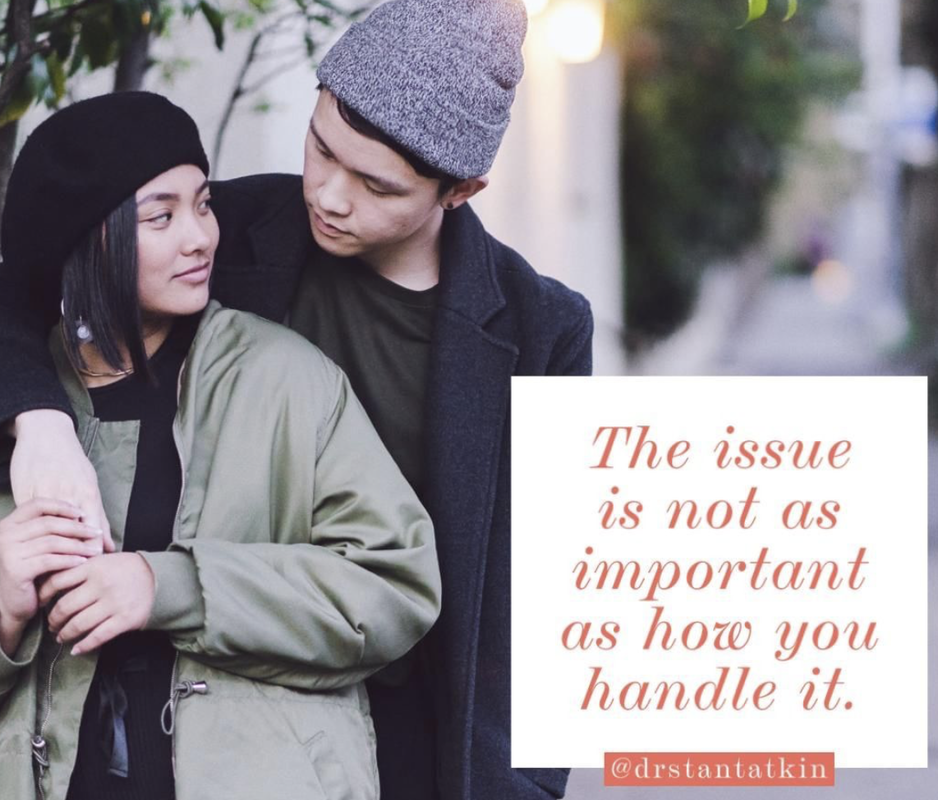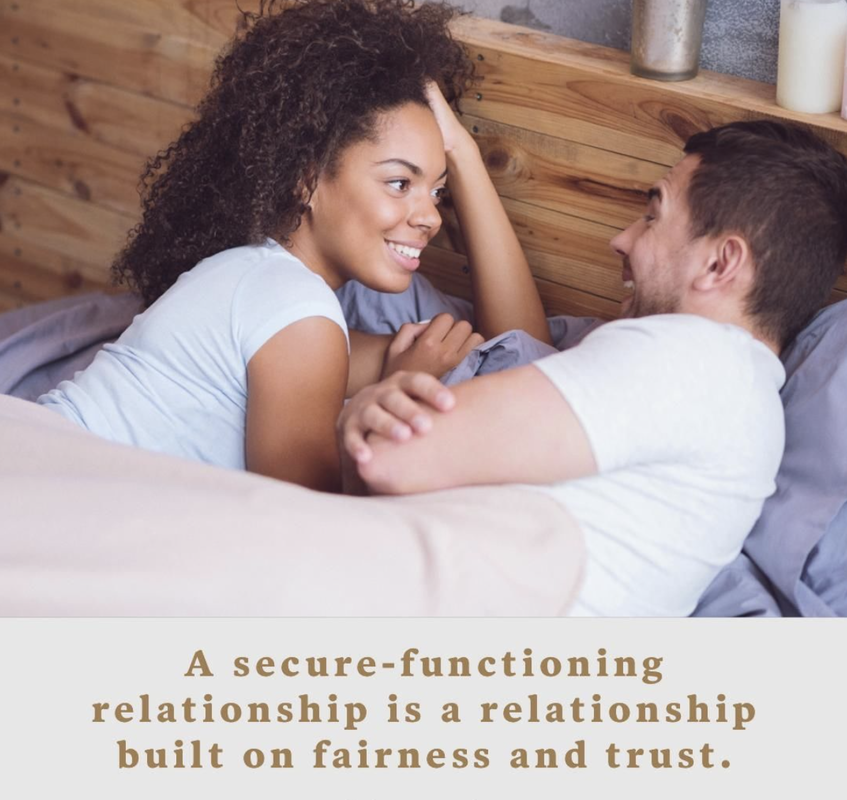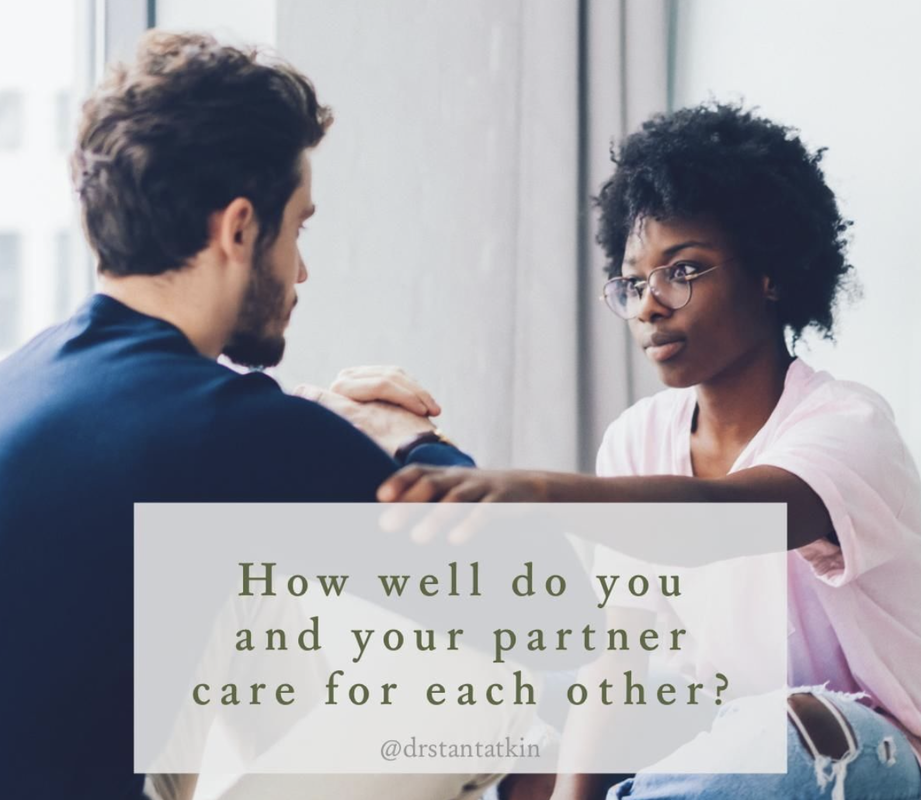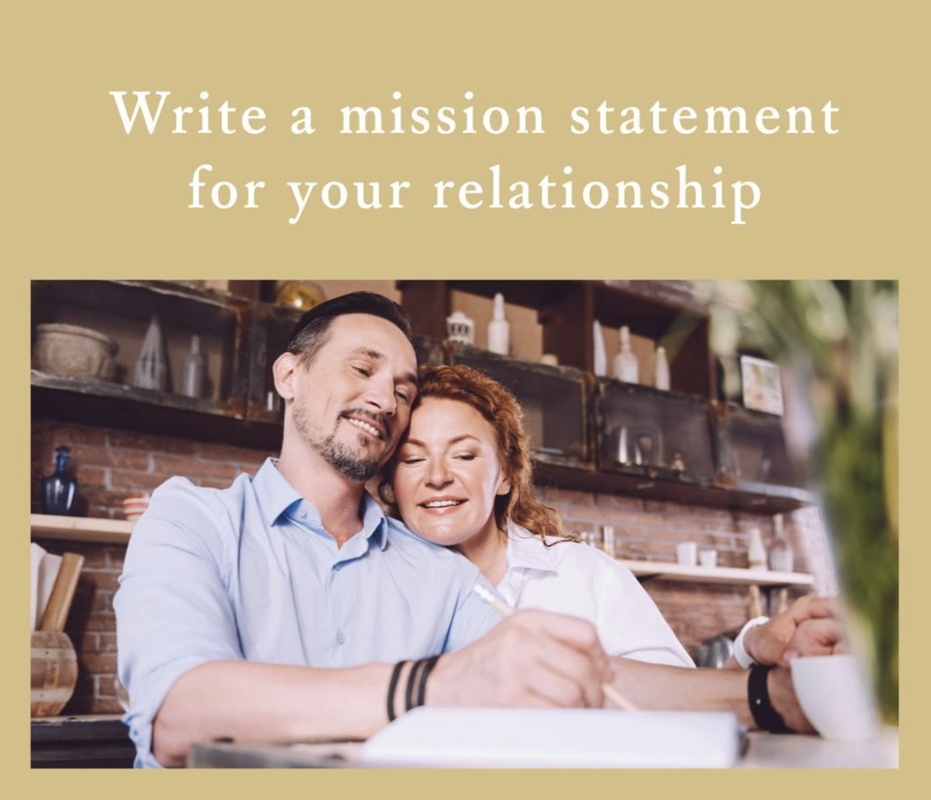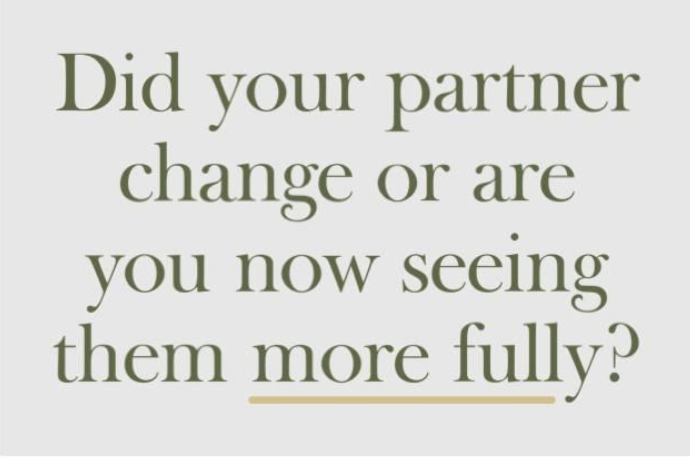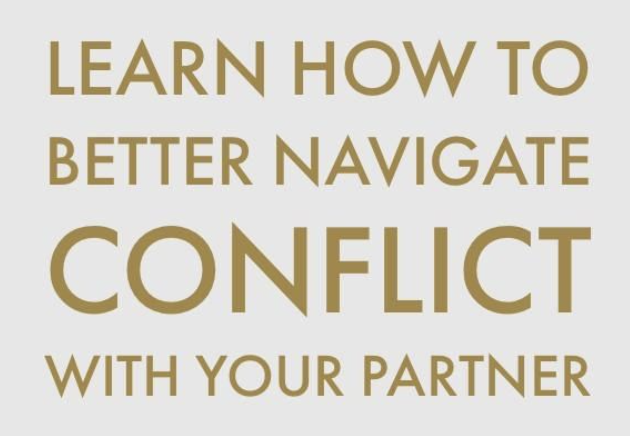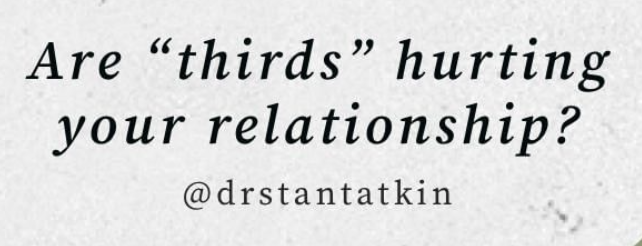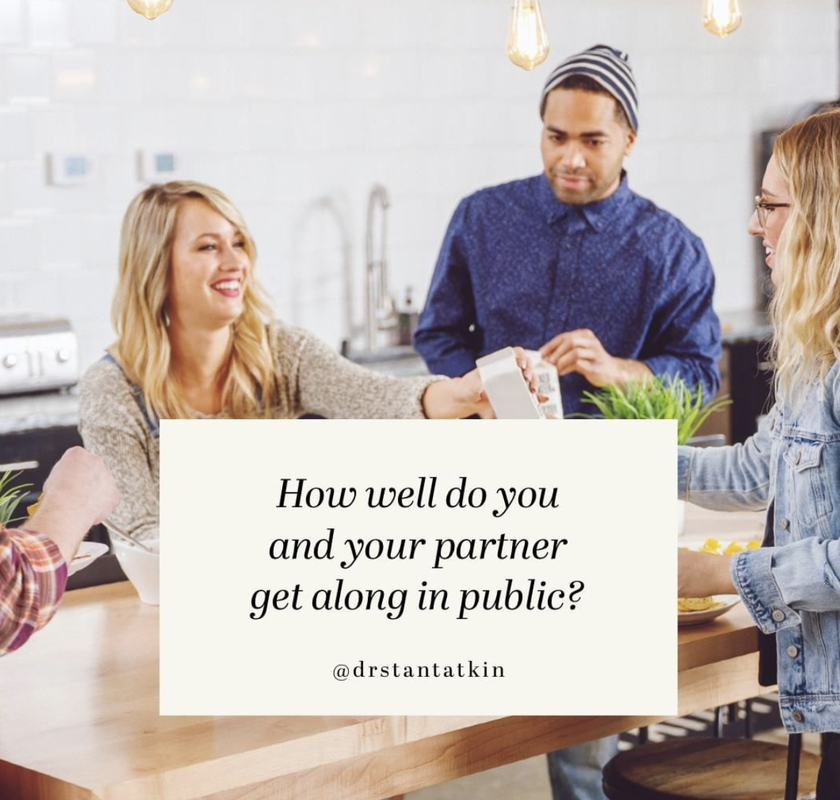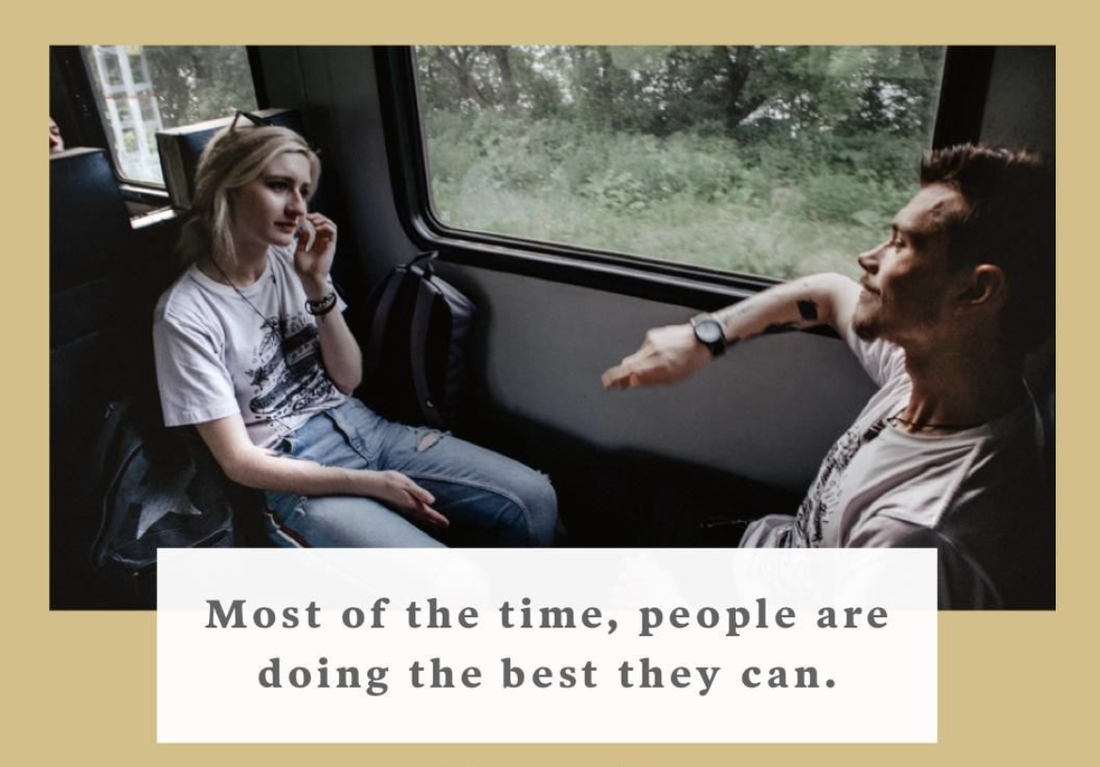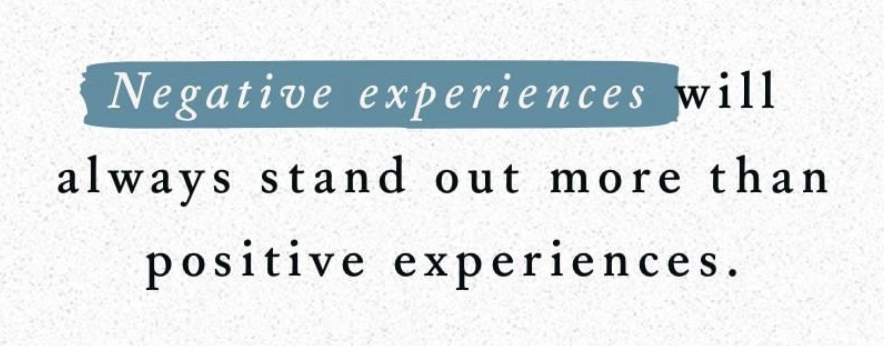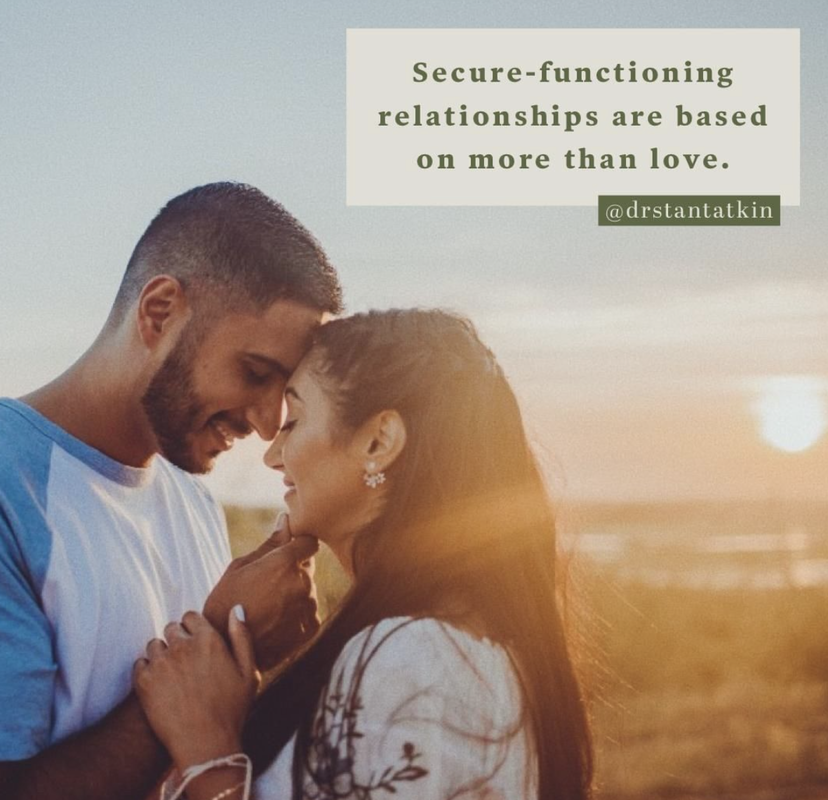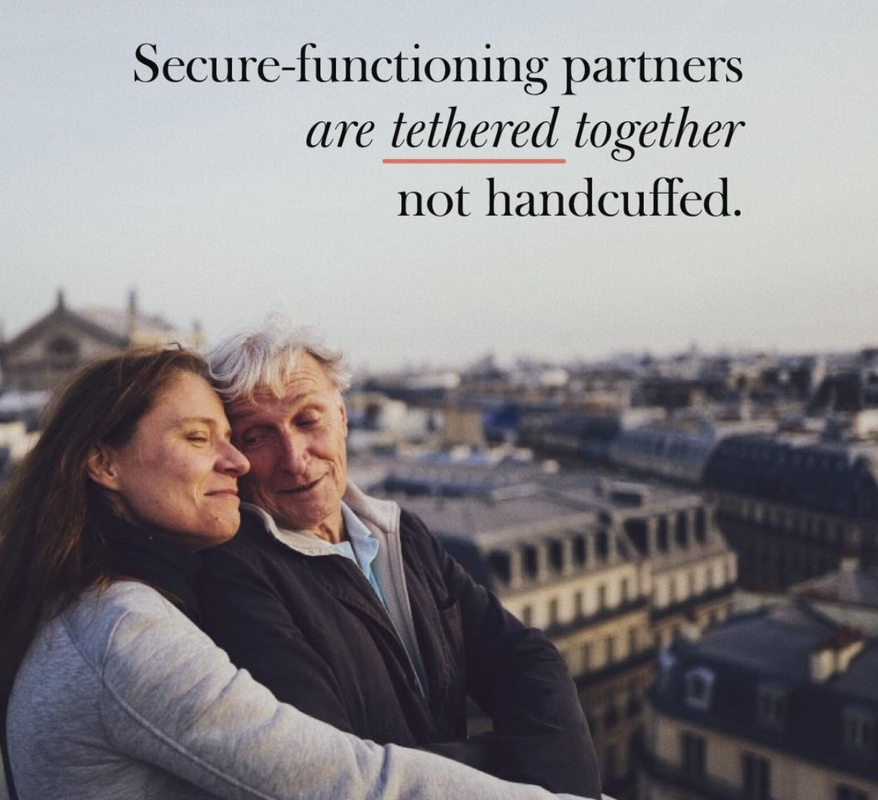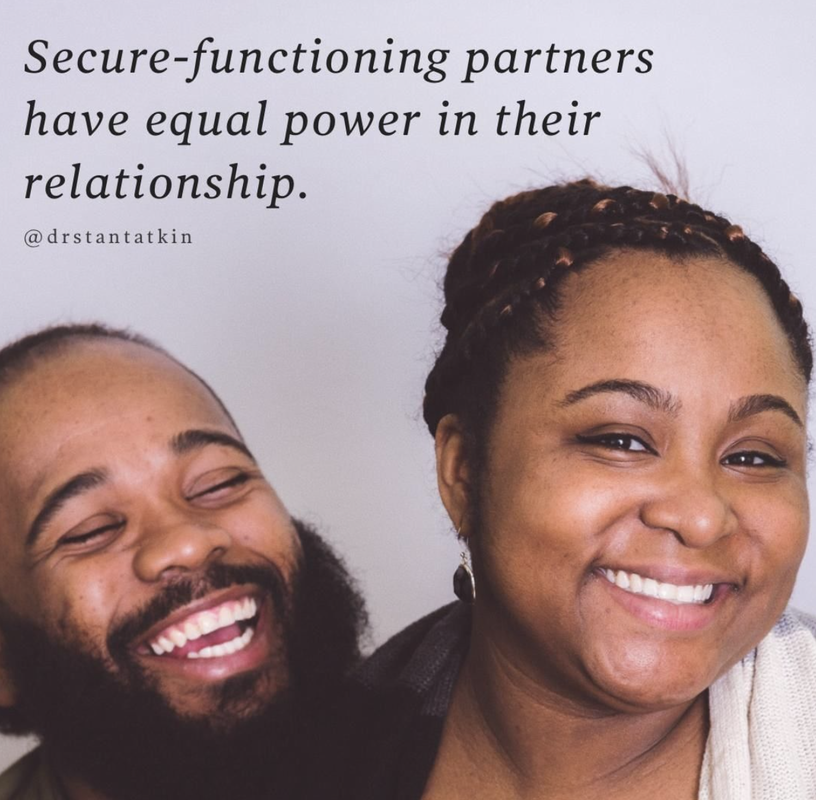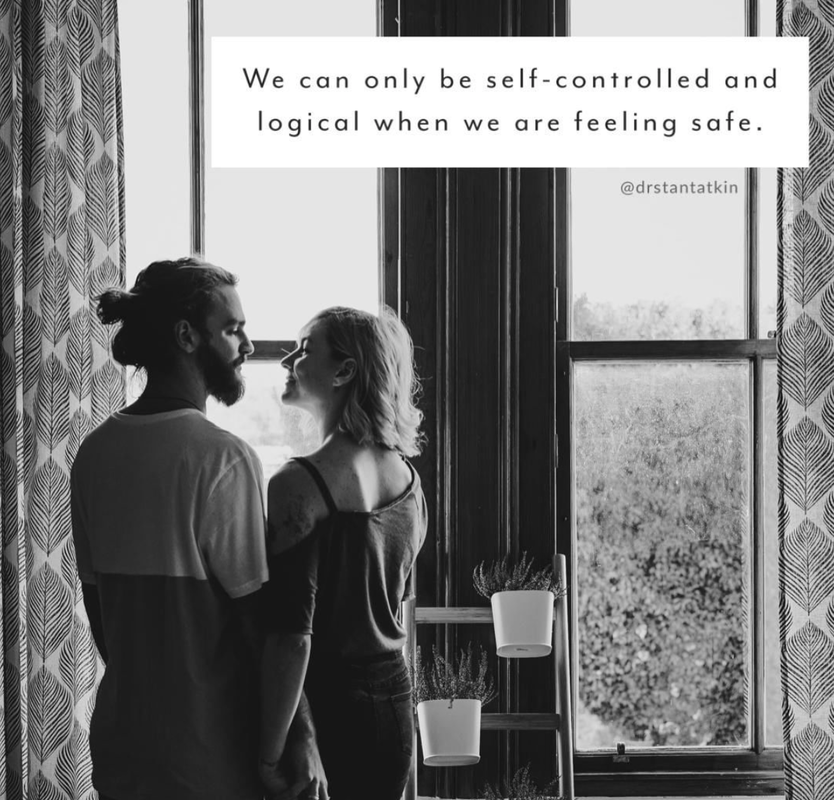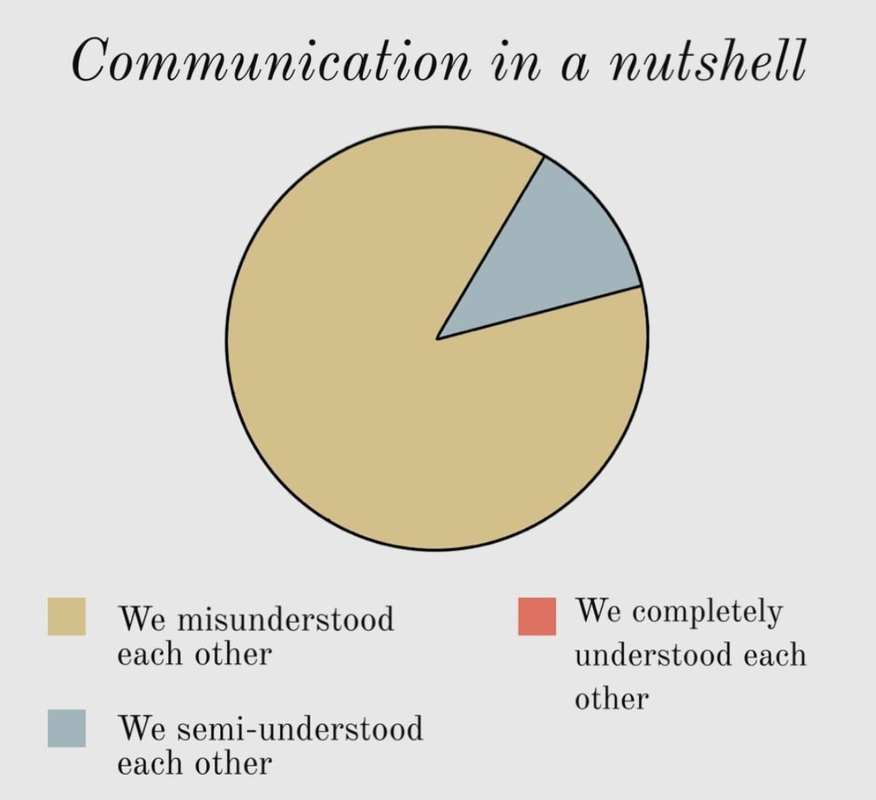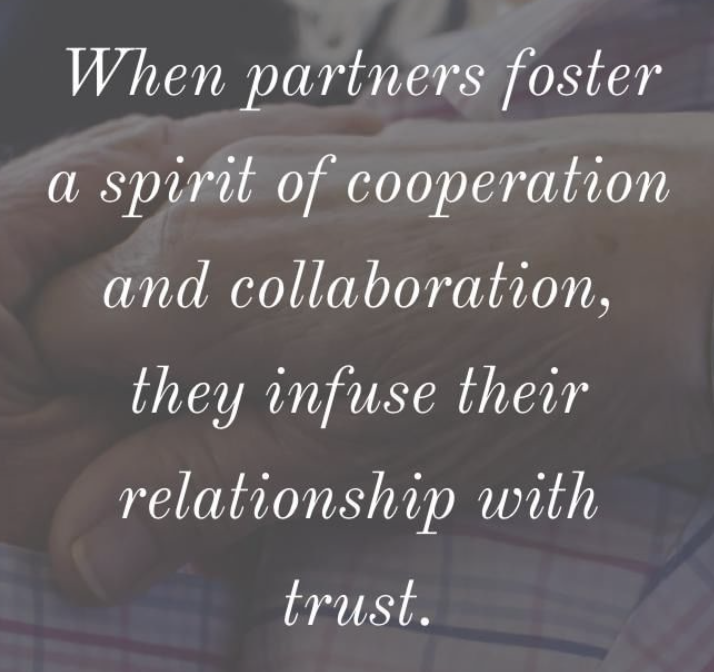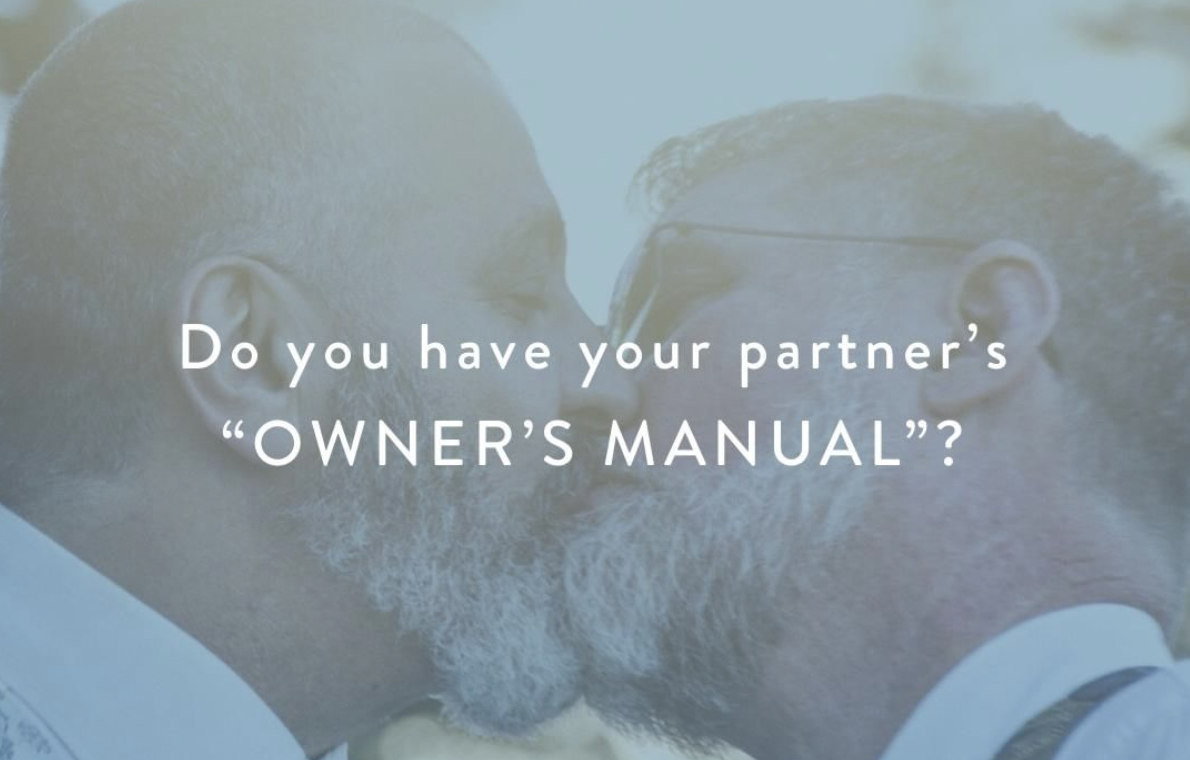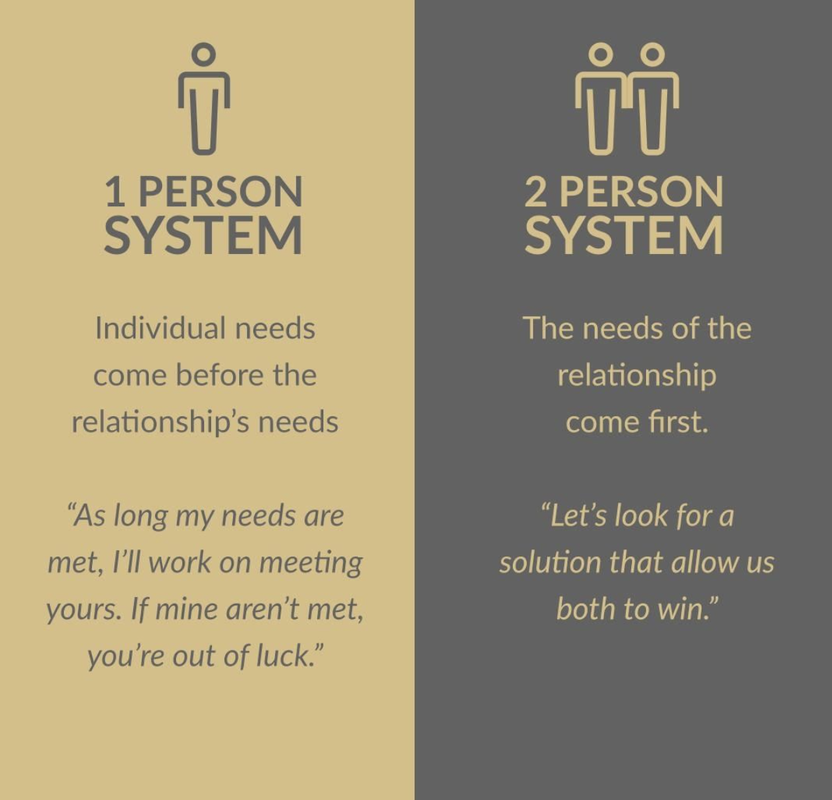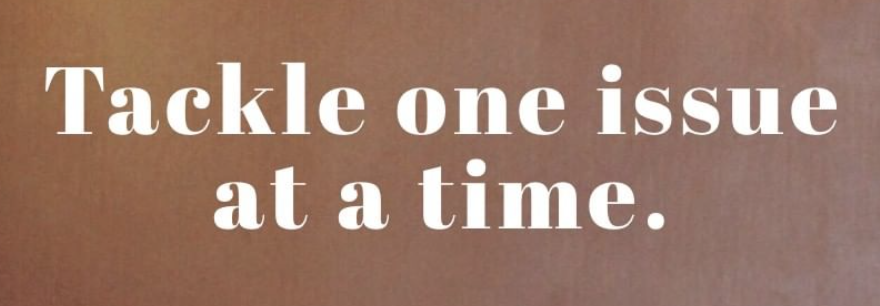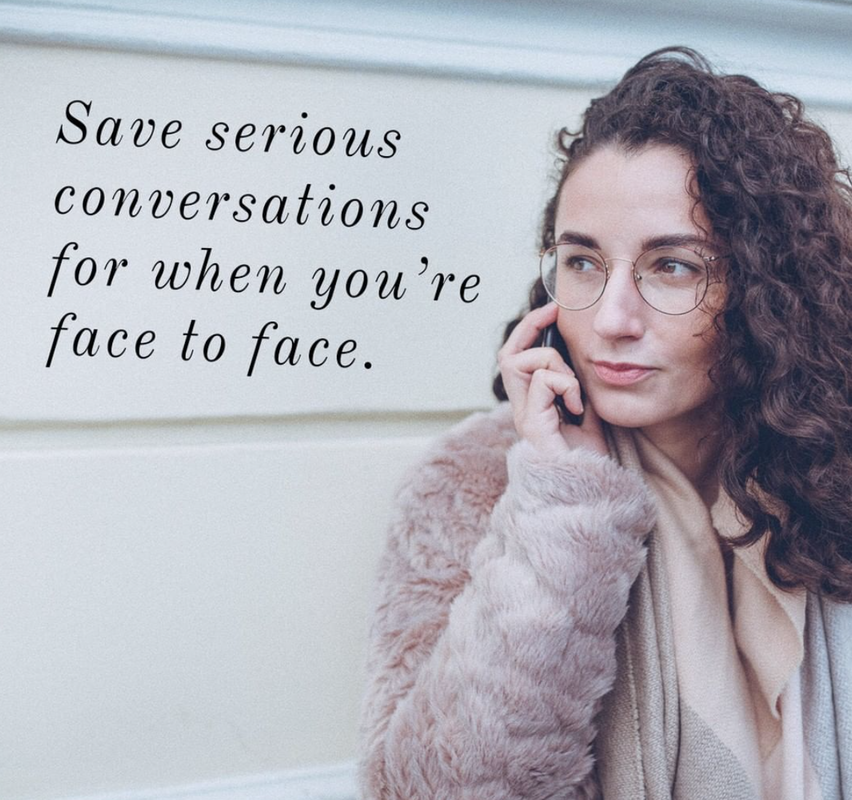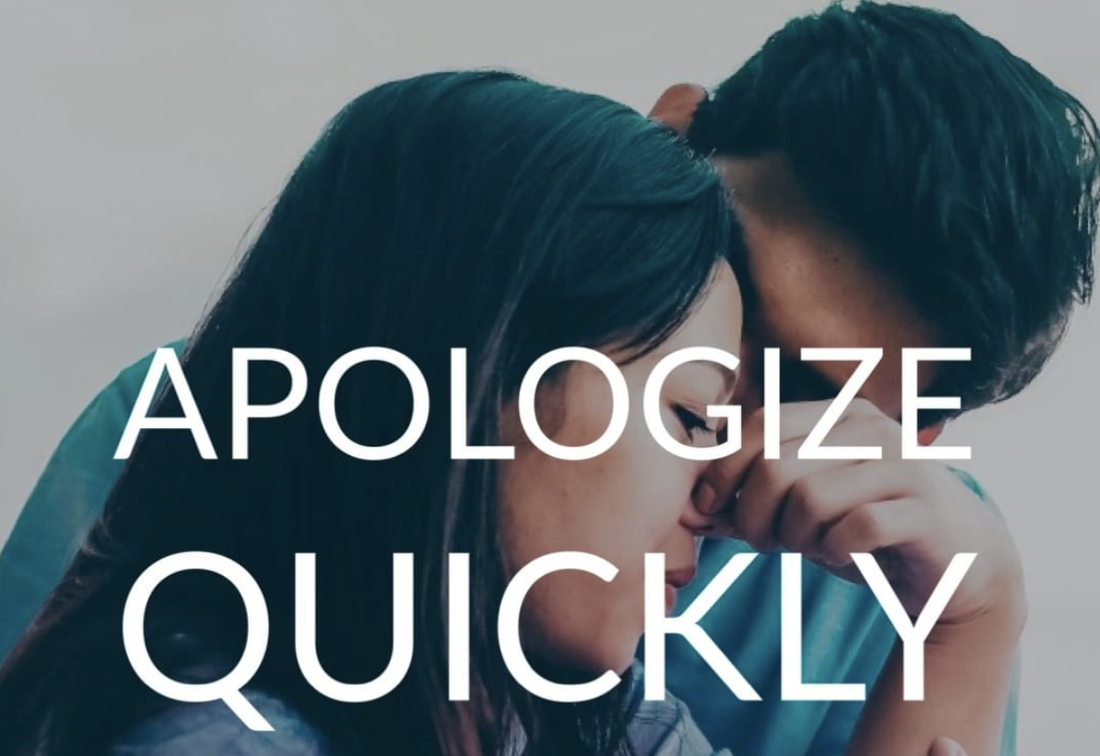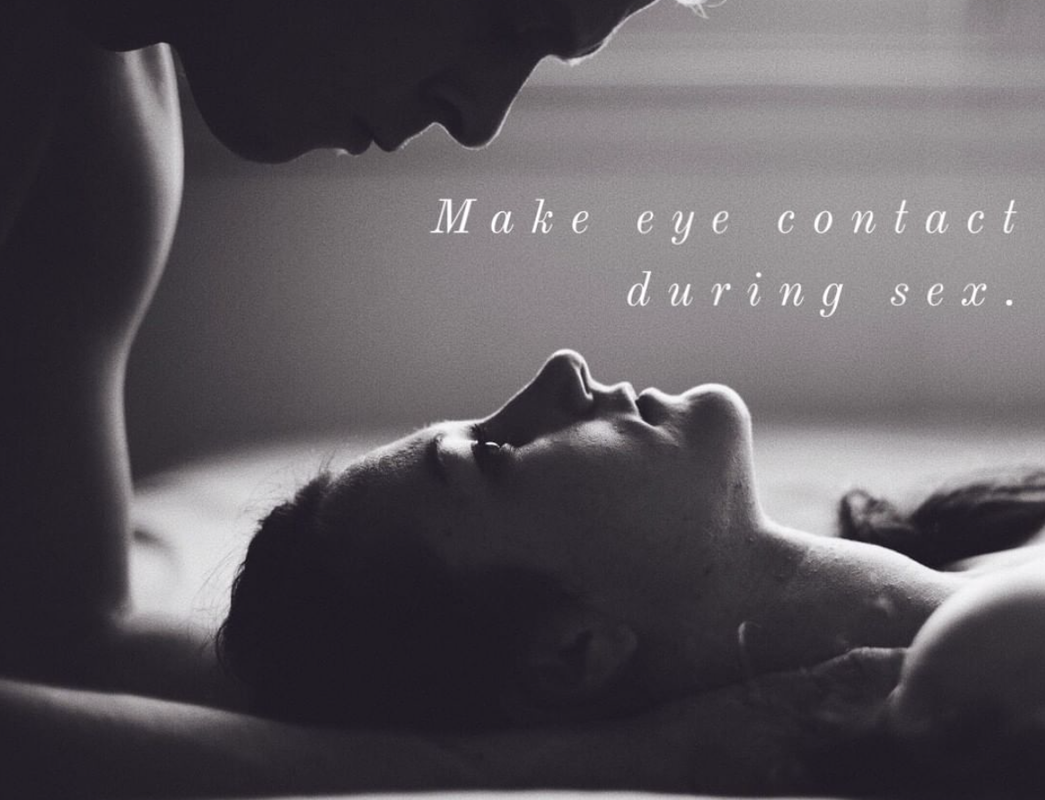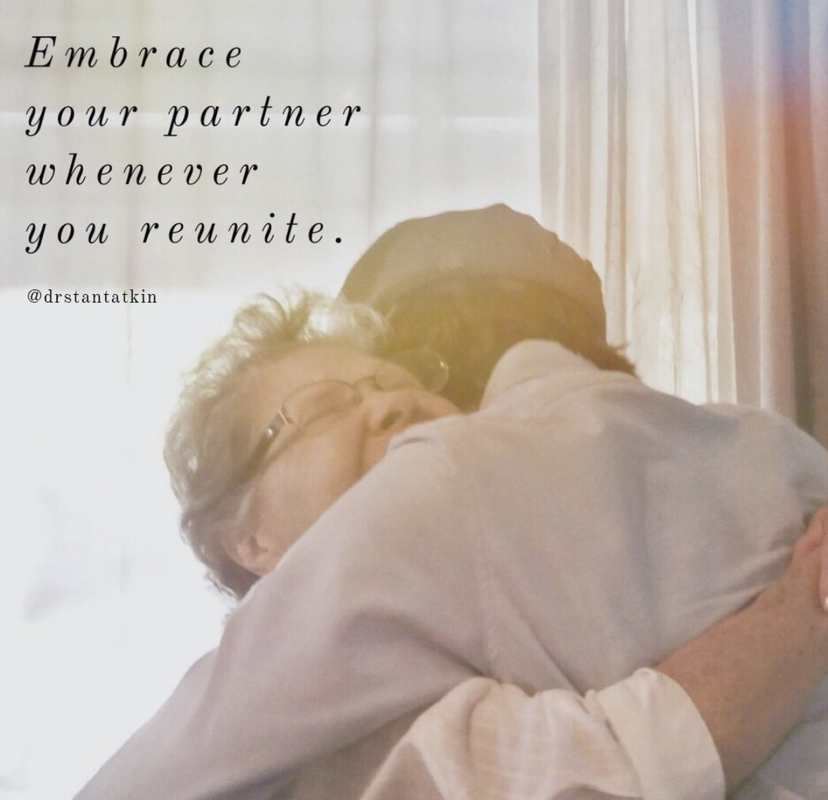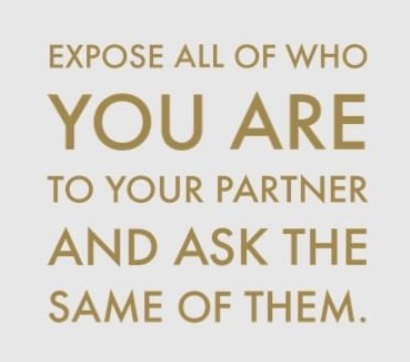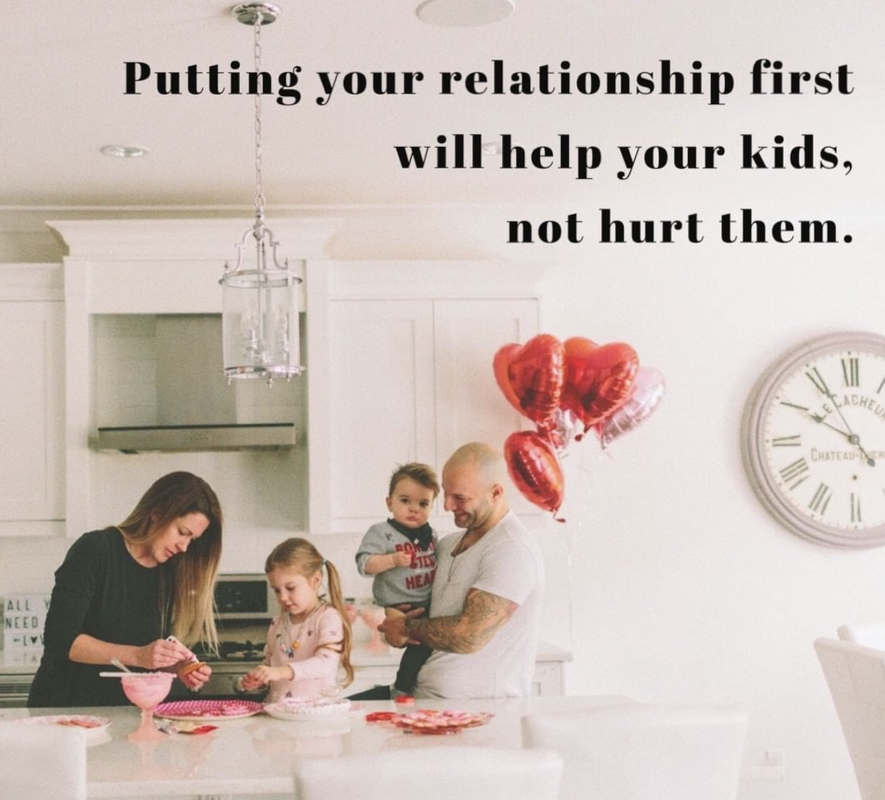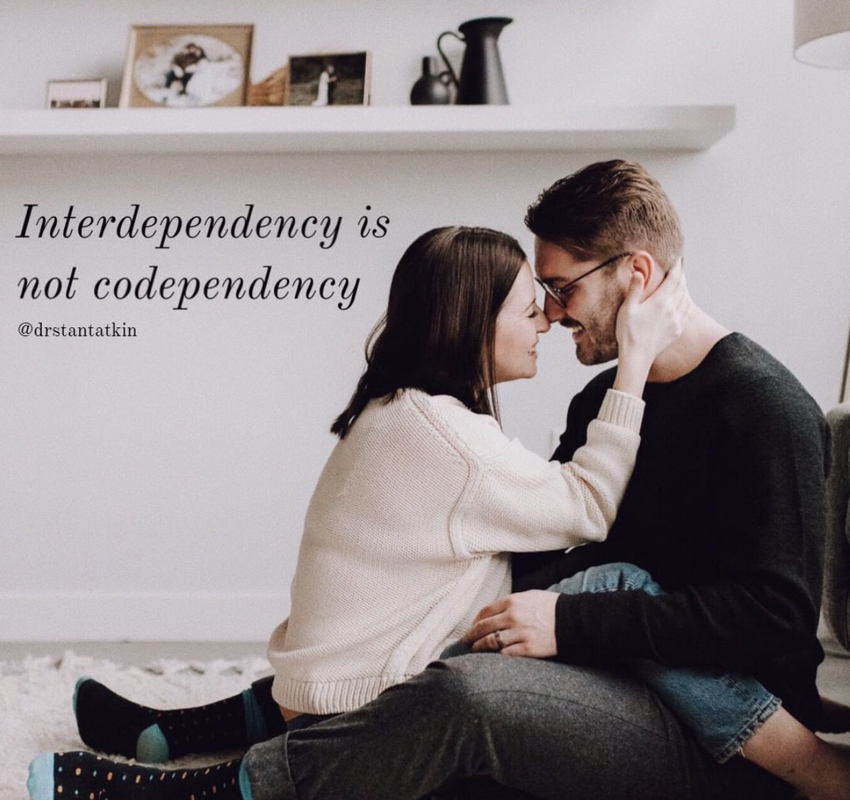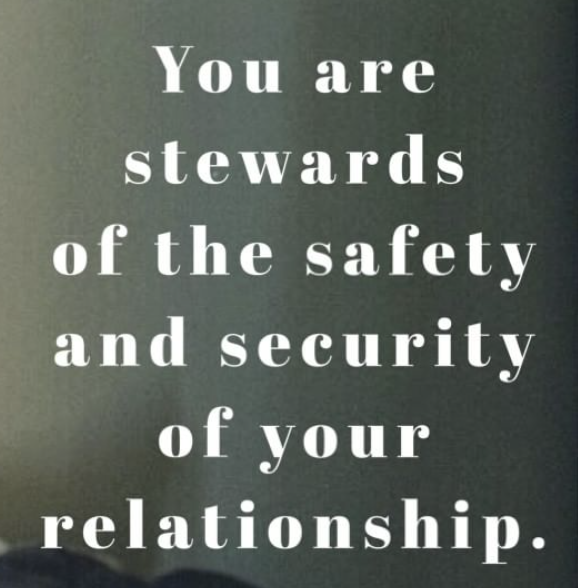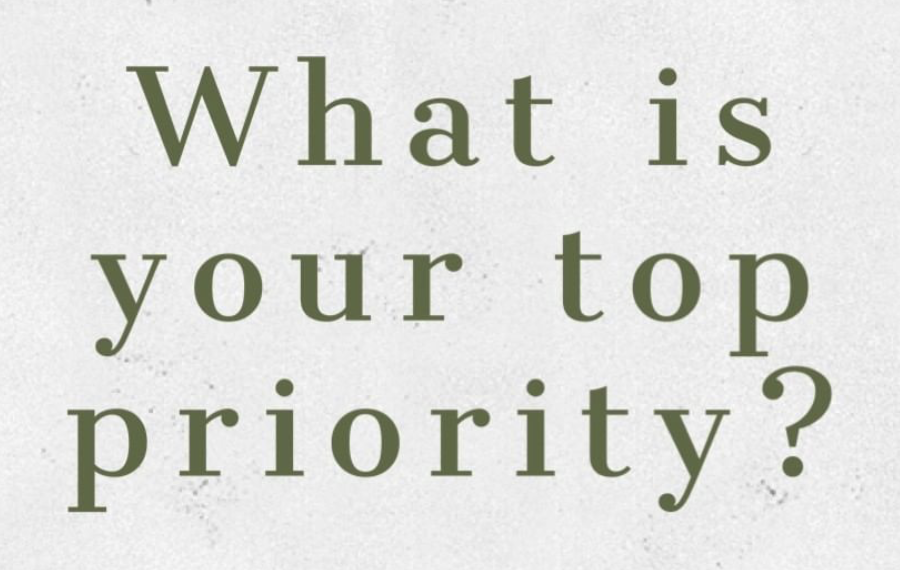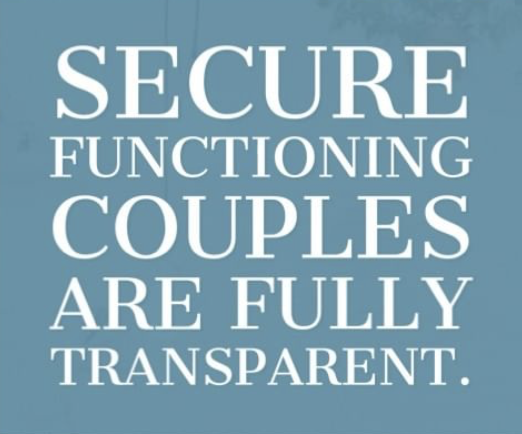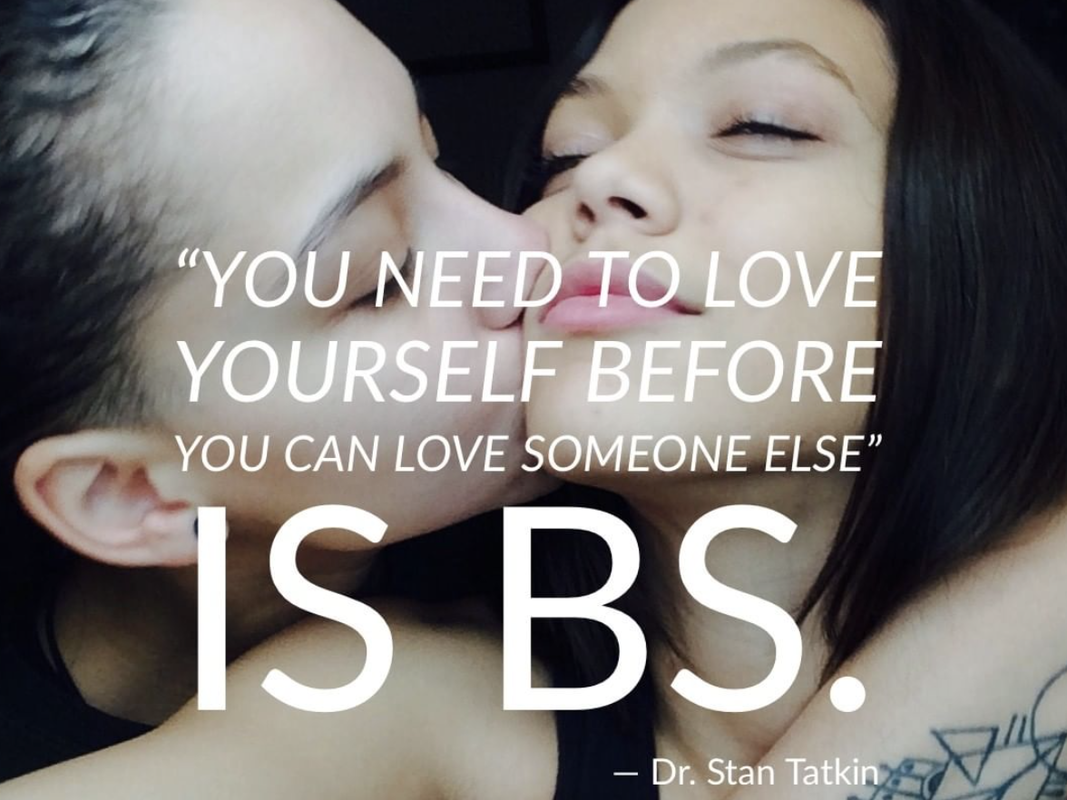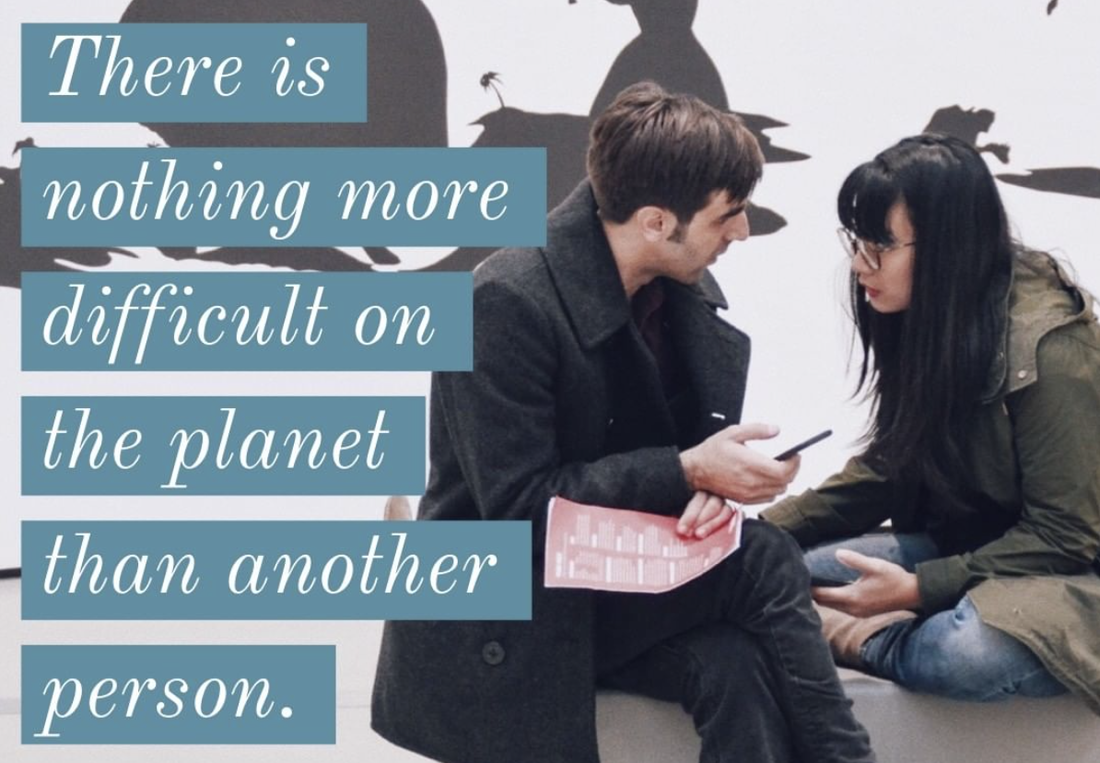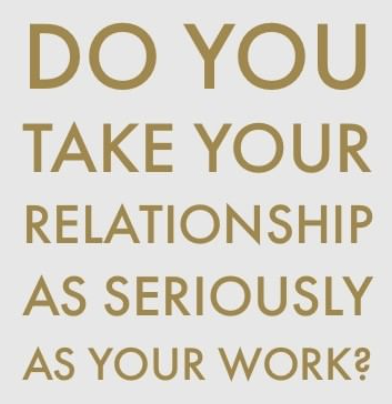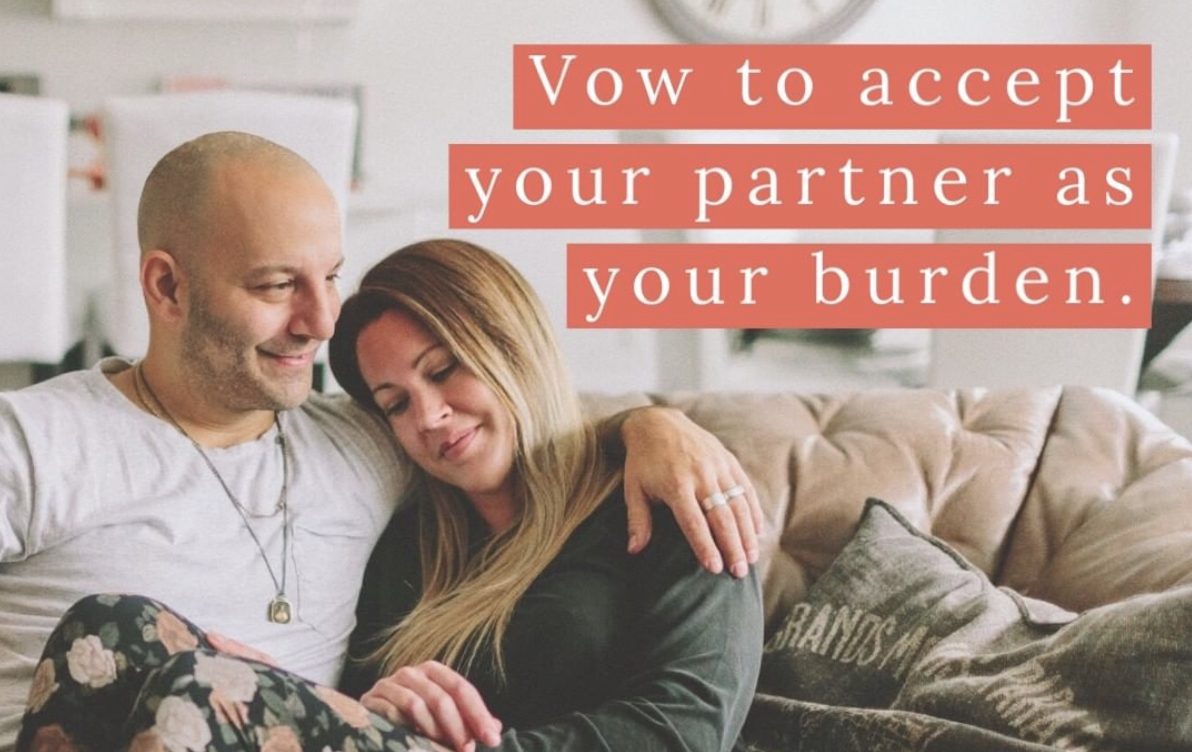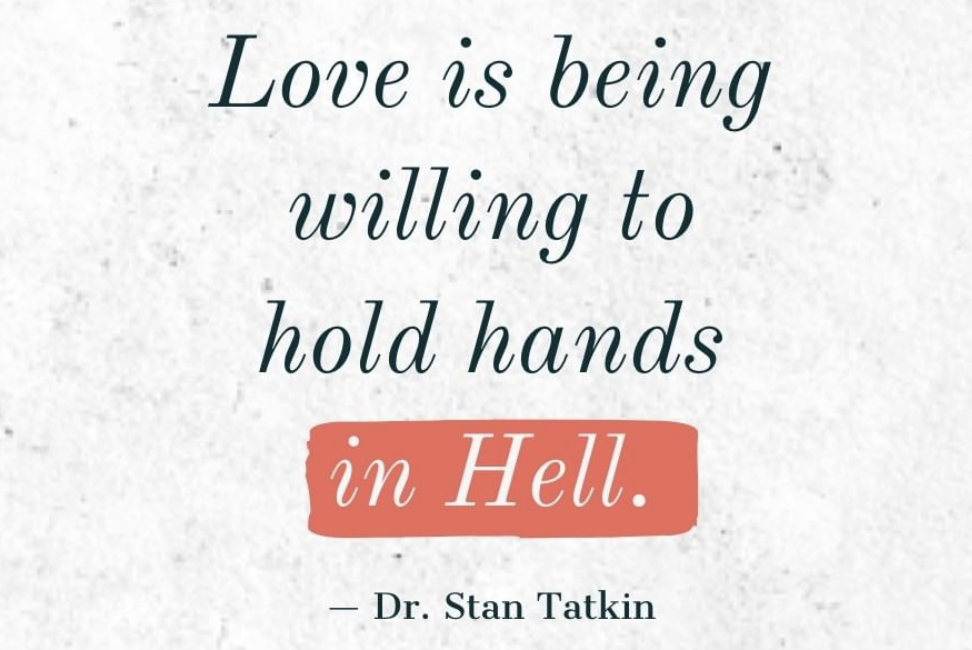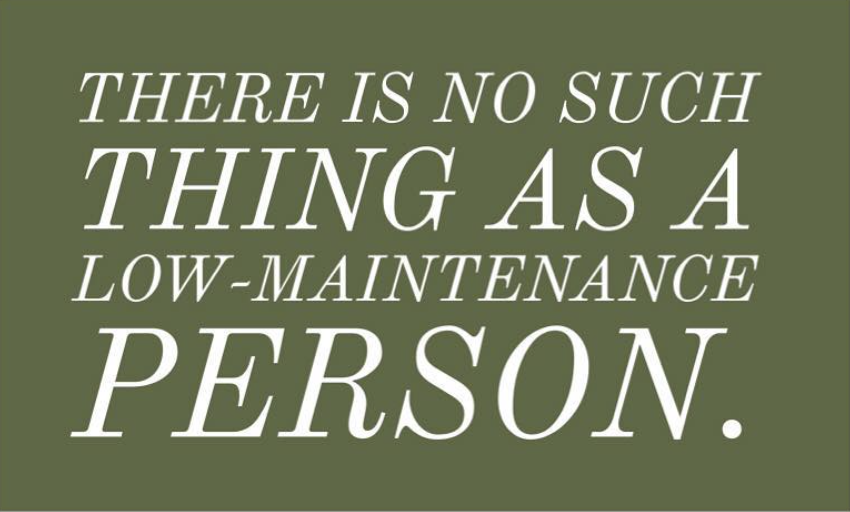Dr. Stan Tatkin Instagram Posts on Secure-Functioning Relationships
All successful long-term relationships are what I call secure-functioning relationships. Through secure functioning we form healthy attachments with one another. You and your partner take care of each other in ways that ensure that you both feel safe, secure, protected, accepted, and loved at all times.
Secure functioning can be observed all over the world, across socioeconomic strata, and among those with varying physical and mental health issues. It’s a set of principles and decisions between two individuals based on survival and begins with the idea that we have each other’s back.
Secure functioning can be observed all over the world, across socioeconomic strata, and among those with varying physical and mental health issues. It’s a set of principles and decisions between two individuals based on survival and begins with the idea that we have each other’s back.
What Are Your Shared Principles that Insure Secure-Functioning?
It is so easy for us to go to war with each other because of how our brains are built. They were built for survival. No matter how smart we are as human beings, we are amazingly sloppy when it comes to day-to-day interactions with another person. So how do you avoid this? Come up with shared principles of governance with your partner. This is a shared vision of the relationship that aligns the two of you to protect each other from your own worst impulses. These principles can act as guardrails. They formalize the behaviors between the two of you when conflict is running high.
15 Rules for a Secure Functioning Relationship
|
|
|
We are touch-oriented creatures. Of all the senses you use to relieve stress, sound, smell, touch, vision, and taste, nothing comes close to touch. When your partner is in distress, friendly eye contact or kind words can certainly help in reducing their stress, but a hug or embrace can more immediately calm your partner’s nerves.
|
|
If you and your partner are in distress, it’s important not to deal with more than one topic at a time. Our brains do not have the mental resources to talk about multiple subjects even when we are feeling good. It’s even harder to keep track when we’re not feeling good, because our mental resources and energy are already being taxed. Keep your arguments to just one topic. This way, you can actually see progress and have something positive come out of the discussion.
|
|
Your ability to tell a story with your partner can be a sign of how well you play and collaborate together. A secure-functioning couple speaks as if they are one person telling a story. They speak for one narrative, and don’t get tripped up by small details or facts. Insecure couples, on the other hand, cannot get past their individual versions of reality. They end up fighting over the details of the story. Usually to the discomfort of the company listening in. They don’t play well together and there’s no give and take. The secure couple succeeds because they give up the idea of precision. They love to play with each other more than they love accuracy.
|
|
What holds you and your partner together for the long run? What is the point of you two being together? What do you do for each other that you couldn’t pay someone to do? What’s so special about them? Your reasons for being together ought to be bigger than simply “we love each other,” “we’re attracted to each other,” “we have the same interests,” or “we have children.” You and your partner need something bigger, better, and more forward to bind you together for the long-run. Look for a purpose that has to do with protecting each other and allowing each other to thrive.
|
|
You may feel very close and safe with your partner, but that feeling is subjective. Your partner isn’t likely to know how you feel unless you tell them, and vice versa. Discover with your partner some of the ways you offer closeness to each other:
|

A couple bubble means that partners are in accord with each other in terms of what they serve: the relationship. This doesn’t mean they serve each other, it means they serve each other within the relationship. The relationship itself becomes the ecosystem. This means protecting you and your partner’s resources. If you or your partner are worried about whether the relationship will last, then that stress is taking up valuable resources. Secure-functioning partners take that off the table by making it crystal clear they aren’t going anywhere. You and your partner are strapped in for the ride. This need not mean marriage, by the way. Every relationship is different in how they choose to commit to one another, and it does not matter how the two of you choose to do it. Maintaining this couple bubble will actually free up resources and allow you to spend them on more important things like being creative, being better parents, better lovers, and move both of your development forward. This way the relationship is always moving in the direction of growth and complexity.
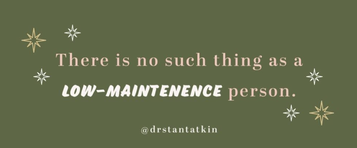
If you think someone is low-maintenance, that just means you don’t know them well enough yet. We are all high-maintenance. It’s just that our annoying and difficult traits are more likely to be on display in our primary relationships. Work on accepting the less complementary qualities of each other. Understand and expect that you will be each other’s burden. That being said, I am not giving you a free pass to be intentionally difficult. We must all try our best to be as easy to get along with as possible, as being unnecessarily difficult will only hurt both of you. If you know the ways you and your partner can be challenging, you can both work together to prevent unnecessary conflict.
|
In the absence of information, your brain will always go for the negative. Be aware of this when interacting with your partner. If pauses are too long or there is a lack of clarity in communication, your brain will start filling in the gaps with inevitably threatening details that aren’t necessarily true. Why would nature set us up this way? Because humans grew up in a dangerous world. Your brain is wired to protect you from an environment where your awareness of predators was dependent on your survival. However, it’s not always working in your best interest to get along with your partner.
|
|
When you recite your relationship vows, perhaps you should say, “I take you as my pain in the ass, with all your history and baggage. I take responsibility for all prior injustices you endured at the hands of those I never knew, because you now are in my care.” Now, I doubt many people would proclaim these in a wedding ceremony, but this is exactly what secure-functioning partners sign up for. They make the conscious choice to take each other “as is.”
|

The primitive part of your brain specializes in survival. It has been around since the dawn of our species. This part of your brain operates without permission. It is the first in the chain of command, trumps all other needs and wants, and it is naturally geared to wage war. This system has the advantage of millions of years of evolution. It is incredibly fast and efficient–too efficient to use the parts of our brain that could collect and analyze information. This may have helped us survive as a species, but it does not help when interacting with your partner.
|
The love you will experience in a secure-functioning relationship is stronger than the feeling of love that most people talk about. It is a love that comes from the daily evidence of devotion and protection. It is earned out of respect, because you are doing things for each other that nobody would ever want to do. You are each other’s confessors, healers, guardians, and lovers.
|
|
Remember: people are generally trying their best. It’s unlikely that your partner is purposefully trying to upset you. More often than not, the issue is resulting from an error of some kind: a miscommunication, misunderstanding, or perhaps, a lack of security. There may be a genuinely good reason behind the issue, but it’s likely not intentional on anyone’s part.
|
|
The security of your relationship depends on you fully accepting each other. This means accepting the things your partner may not be particularly good at. The common issues that come up are: messiness, finances, and time-management. You’re not going to suddenly change someone who is always late to be on time, or someone who is always messy to suddenly be tidy. No matter how much you try, that person is always going to do what they do. So instead of trying to beat up someone for being who they are, the two of you could come up with a “hack.” Hacks are workarounds that take into account the reality of the things that we can and can’t do very well. If your partner is messy, you could hire someone who cleans the house. If you are always late for things, set timers and alarms. By having these workarounds with your partner, you can address the issue without trying to do the impossible task of changing who they are.
|
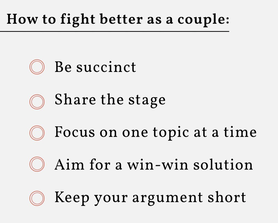
We all have a “window of tolerance” in which we are able to fully engage. If we perceive too much threat, we leave that window and go into fight, flight, or freeze. Be aware of this when you are in an argument. If you notice you or your partner are leaving your window of tolerance, take a break. You don’t need to fix a problem with one conversation. To give yourself the best chance of staying in this window of tolerance:
- Don’t beat around the bush. Get right to your point and be succinct.
- Make sure your partner is given equal time to make their points
- Only focus on one topic
- Aim for a win-win solution
- Agree to keep your argument short
|
It's generally not the content of an argument that causes problems, but the rapid amount of errors your and your partner's brains make during these interactions.Your brains act and react reflexively according to your emotional state and different (unreliable) memories. The key is in learning how to lesson these errors.
|
|
99% of what we do is automated by our brain. Most of the time, we are acting reflexively not consciously. With this in mind, if you want your partner to avoid doing something that you find hurtful or just plain annoying, telling them more than once likely won’t be enough. They’ll probably repeat that behavior in the future unless you cue them to do otherwise. Come up with something you can do in the moment to remind them of the behavior you’d like them to avoid. This can be a physical cue, such as tapping them on the shoulder, or a verbal cue, such as a specific word.
|
|
Smart couples fight to seek an outcome that allows both partners to be winners. Aiming for this win-win outcome makes the statement that you are both in this together. Put your collective energies into making sure the solutions feel meaningful and worthwhile for the both of you. Giving up on a mutual agreement may mean you get what you want with no compromise in the moment, but will only hurt the relationship in the long term. If you and your partner reach a point where you still aren’t both satisfied with a solution, then the negotiation may not have to be symmetrical. One of you may have to give up more at that particular moment. However, for the long run, any inequities need to balance out. A secure partnership should prevent either of you from keeping a tally against the other.
|
|
Learn to rapidly repair damage as it comes up. Seeing your partner in distress should raise the alarm to immediately “stop the presses” before you do anything else. It doesn’t matter if your partner is upset because of something that happened between the two of you, or because of something else. Making your partner feel better is up to you, no matter the cause. Become experts on each other so you can notice distress quickly and tend to it effectively.
|
Love is not enough. In fact, it’s simply the catalyst that got you together. What will allow you to thrive is creating a secure base and purpose as a couple. Align yourselves around principles of fairness, justice, and sensitivity for one another.
|
A secure-functioning relationship can only be formed if you and your partner fully accept each other as you are. You must accept the good, the bad, and the ugly in each other. Picking and choosing the parts you like about your partner will only lead you to trouble. Nobody signs up for a relationship to be changed by their partner.
|
|
Do you have a habit of doing the same thing over and over that bothers your partner? You’ve likely already told them you’d stop to no avail. This is because we run on automatic most of the time. You may need your partner’s help to break the habit. If we have someone to remind us, we’re able to be more mindful of our actions.
|
|
Deal with issues that come up immediately or as soon as possible. When conflict is not resolved, emotional injuries begin to accrue. Failing to repair distress between the two of you repeatedly over long periods of time can lead to the two of you subconsciously viewing each other as a threat.
|
There are no angels or devils in relationships. If there are issues in your relationship, it’s likely not just your partner’s fault. Be willing to examine how you play a part in the problems that arise between the two of you.
|

Humor prevents your relationship from becoming rigid and brittle. It’s important that you and your partner can share and enjoy each other’s sense of humor. It can act as a great regulator when you are under stress and can strengthen the bond between the two of you.
Attempt to make your partner laugh as an exercise. Try lots of different ways to get them to laugh. Explore their sense of humor and look for what they find funny. Determine what they don’t find funny and what they find offensive. Find out if your partner is a producer of humor, an appreciator of humor, or both. Don’t make jokes at your partner’s expense, joke about things that aren’t funny to your partner, or tickle them.
Attempt to make your partner laugh as an exercise. Try lots of different ways to get them to laugh. Explore their sense of humor and look for what they find funny. Determine what they don’t find funny and what they find offensive. Find out if your partner is a producer of humor, an appreciator of humor, or both. Don’t make jokes at your partner’s expense, joke about things that aren’t funny to your partner, or tickle them.
|
All partners must have a common purpose together. There must be a sustaining reason for partners to coexist over the long term.
As an exercise, try developing a succinct couple mission statement with your partner. This mission statement will help you develop a shared notion of what the relationship should be not just today, but for the future. It should lay out why you are a couple. Be completely open and honest when you do this. Here are some questions you could ask each other:
|
Can you successfully argue for what your partner needs? Knowing what your partner needs, what their fears are, and what they worry about is essential so you can reach a solution that benefits both of you. A solution that only benefits you comes at the cost of your relationship, which will wind up hurting you in the end. Taking care of your partner’s needs along with your own will always be to your benefit.
|
In a conflict, the more you believe that you are right, the more trouble you can get into. Memory, communication, and perception are just plain unreliable. This goes for everyone. It’s more than likely that the real story is not what you think.
So instead of holding on tightly to your ideas, focus on your relationship instead. Let go of who is right about the past and focus on how you can repair each other’s pain in the present. The security of your relationship is far more important than being right. |
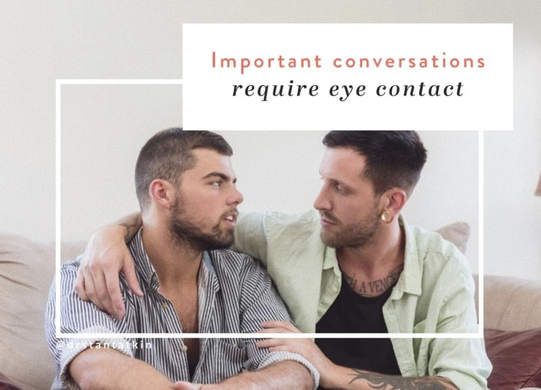
A lot of people don’t look at their partner or pay attention to their face while they are talking. This is a mistake. Your partner’s face, voice, and movements can all shift in the middle of a conversation. If you don’t notice this shift, you may be getting yourself into trouble and raising your partner’s threat level.
How do you fix this? By staying face-to-face.
Eye contact is essential for important conversations. Our eyes are made to see the world in high definition, but only for what is straight in front us. If your partner is in your peripheral, you’ll miss almost every visual cue your eyes could be telling you.
When having a discussion, if you see something in their face or body language that says something is not working, or is not landing, stop and check in with them.
If you’re not making eye contact, you may miss these cues and your conversation could go off-track without either of you noticing.
How do you fix this? By staying face-to-face.
Eye contact is essential for important conversations. Our eyes are made to see the world in high definition, but only for what is straight in front us. If your partner is in your peripheral, you’ll miss almost every visual cue your eyes could be telling you.
When having a discussion, if you see something in their face or body language that says something is not working, or is not landing, stop and check in with them.
If you’re not making eye contact, you may miss these cues and your conversation could go off-track without either of you noticing.
Building a successful and secure-functioning relationship takes time. Oftentimes people can get frustrated that they are not naturally “good” at relationships, but in reality there are very few people who are born with the skills required. The rest of us, like almost anything else, will have to learn as we go.
|
It is common to hear, “I’ve got to learn to love myself before I can love someone else.”
The thing is, we learn through our relationship with others, from childhood into adulthood. You can continue to learn how to love yourself as you learn to love another. There is no such thing as “being ready” to be in a relationship. If you wait until you feel “ready,” you may be waiting a very long time. |
Secure-functioning partners talk in a way that is collaborative. When you talk with your partner, you have a responsibility to speak with them in mind.
Being careless about how you speak to your partner means you are focused more on what is good for you than on what is good for the both of you together.
- Are you being concise?
- Are you staying on topic and telling the truth?
- Are you doing your best to be coherent?
Being careless about how you speak to your partner means you are focused more on what is good for you than on what is good for the both of you together.
|
We are misunderstanding each other most of the time. Human communication on a good day is terrible. Even when you are listening with your fullest attention, you are never doing more than approximating one another.
So verbal communication can get you into a lot of trouble. Brains like to automate and take shortcuts. You are likely taking these shortcuts and assuming your partner understands the meaning of your words. If your partner doesn’t understand the meaning of your words, does that mean they weren’t listening? How do you know? How do you know you were being coherent and clear? The answer is likely that no one is at fault here. This is a universal problem. Verbal communication is very murky. Understanding this may make it easier to become less frustrated the next time your partner misunderstands you. |
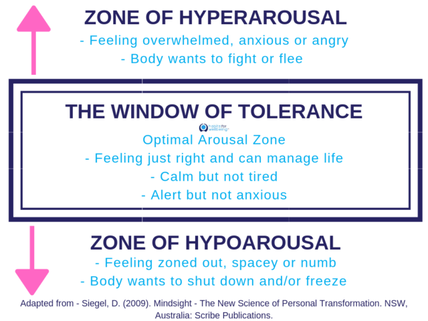
In interacting with your partner, it is important to understand the concept of “the window of tolerance.”
Imagine a barrier. While you remain within this barrier, you can feel safe. You are able to deal with frustration without losing control or running away. You are able to socially engage.
This is where you want to operate when communicating with your partner.
If you go outside of this barrier, the resources your brain needs to stay collaborative are no longer there. You start to go into fight-or-flight or collapse.
If you start to notice you or your partner are leaving that window of tolerance, take a break from your argument and tend to each other before moving on.
Imagine a barrier. While you remain within this barrier, you can feel safe. You are able to deal with frustration without losing control or running away. You are able to socially engage.
This is where you want to operate when communicating with your partner.
If you go outside of this barrier, the resources your brain needs to stay collaborative are no longer there. You start to go into fight-or-flight or collapse.
If you start to notice you or your partner are leaving that window of tolerance, take a break from your argument and tend to each other before moving on.
|
When you and your partner are trying to come to an agreement, it must always be a win-win solution for the both of you. If you have to drag your partner along or get something at their cost, resentment will build up and you likely find yourself re-litigating the unfair deal down the road.
You two must work in tandem. It may require a little more negotiation and creative energy, but it is worth it. A deal that is good for both of you will contribute to the security of your relationship in the long run. |
When dating, worry less about finding someone who ticks off your entire checklist for a “perfect partner.”
Focus instead on what kind of relationship you envision for your future self. Find someone who wants to form the same kind of relationship that you envision.
Focus instead on what kind of relationship you envision for your future self. Find someone who wants to form the same kind of relationship that you envision.
|
When arguing, you are more likely to be heard when you take care of yourself and your partner at the same time.
Taking care of yourself means not abandoning your own needs. Taking care of your partner, which is generally more difficult, means putting yourself in their shoes, and proving to them verbally that you understand their needs. Finally, always lead with relief. It will help disarm any kind of negative distress they may get from feeling threatened. If you don’t start an argument this way, your partner will feel that they have to defend their own needs since you don’t have their interests at heart. |
|
Beware of non-negotiable issues that would disqualify a partner from being in a long-term relationship with you. If there is anything that would truly be a deal-breaker for you, it should be addressed right away with your partner.
All of us loathe to lose out on the potential for everlasting love, which can make it easy to overlook these issues until we are forced to deal with them. Ignoring them will not make them go away, though. They will threaten your relationship and inevitably cause conflict between you and your partner. It may be uncomfortable to address a deal-breaker, but it will never go away unless it is reckoned with. |
|
It is you and your partner’s job to know each other’s “owner’s manual” backwards and forwards. These are the things that no one else could know: fears, vulnerabilities, and insecurities that are rooted in your histories.
Only by knowing all of this will you know what their “hot buttons” are, and in turn, how to care for them when they come up. |
|
Insisting on being right is a dangerous path to go down. Communication, even on a good day, is convoluted. We are misunderstanding each other most of the time. Additionally, memory is unreliable and perception is like a funhouse mirror altered by the state of your mind.
Given all of this, how right can you really be? Are you willing to stake your relationship on your belief in being right? If so, why? If you have a reason, then take that as a sign that you’re likely leaning towards a one-person psychological system, which won’t help you in creating a secure attachment with your partner. |
Amplify Positive Feelings with Your Partner. Sharing what you are experiencing with your partner can help amplify feelings of excitement and joy in both of you.
It is vital that in moments of distress between you and your partner, you both must move as fast as possible towards win-win solutions and mutual relief. When under stress, we lose much-needed resources for thinking, talking and understanding what’s being conveyed to us. Stick to the essentials, stay on topic, and then turn it over to your partner. If the two of you remain in distress for too long, it will carry over to the next time.
Have you ever been with a couple that is miserable to be around? Generally, these are partners who don’t accept each other fully and don’t take care of each other properly. Not only are they unpleasant for their friends to be around, but couples like this can create a problem for children as well.
To a child, the security of their parent’s relationship equates security in their home and creates the model for what that child will see as “normal” in relationships.
To a child, the security of their parent’s relationship equates security in their home and creates the model for what that child will see as “normal” in relationships.
|
If you want a relationship that stands the test of time, commit to each other knowing your number one reason is to create a secure-functioning, thriving partnership.
You can’t grow and develop toward higher complexity as a creative, productive, and socially advanced human being if your sense of safety and security in your relationship is compromised. If either of you feels unsafe, untrusting, or insecure, you will lack the internal resources for personal and mutual growth. Your mind will instead be preoccupied with doubt and threat. |
Approximately 42 percent of first marriages end in divorce, and the average length of those marriages is only eight years. If you want to beat the odds, what’s the best way? Prevention. Prevent the problems that lead to divorce by becoming experts on each other, accepting each other “as is,” and engaging in a secure-functioning manner that’s collaborative, fair, just, and sensitive.
Stop trying to win when you’re arguing with your partner.
Both of you should scurry toward mutual relief as quickly as possible.
That's the end game. The end game isn't winning. The end game is both of you must win.
Both of you must get your points out.
Both of you must take a stand for what you want while at the same time ensuring that the other person gets what they want as well.
That may sound impossible to you but it isn't. It is exactly what we all should be doing all the time.
Both of you should scurry toward mutual relief as quickly as possible.
That's the end game. The end game isn't winning. The end game is both of you must win.
Both of you must get your points out.
Both of you must take a stand for what you want while at the same time ensuring that the other person gets what they want as well.
That may sound impossible to you but it isn't. It is exactly what we all should be doing all the time.
Be aware that our brains are wired for war. The human brain has a negativity bias, so in the absence of positive interactions with others, it will always go negative. This wiring keeps us alive and out of danger, yes, but it will also make it easy for you and your partner to become distressed over a misunderstanding.
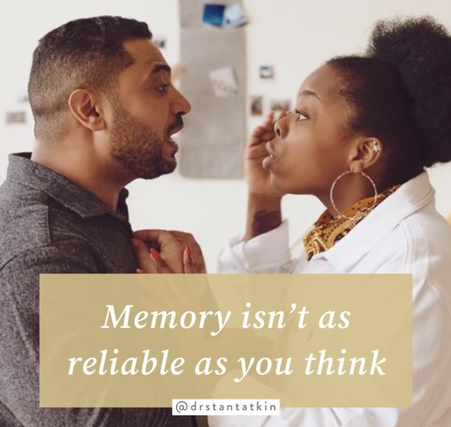
Fighting over how events transpired in the past is not worth it. Human memory is not as good as we believe it to be.
It’s not like pressing the record button on your video camera. That “record button” isn’t always on, so your brain will fill in the gaps with made-up colors, emotions, and embellishments.
Memory is encoded in a variety of ways: verbal, emotional, contextual, somatic (body experience), and so on. If you’re paying attention, the experience you capture goes into short-term memory, which doesn’t last very long. How you record the experience determines how long it stays in memory. If that experience has lots of emotion to it or is unusual, it’s likely to go from short-term to long-term memory.
Finally, the act of remembering is altered by how we feel in the current moment. Those memories can change based on how you feel as you recall them.
Understanding and owning how fallible our memories are can help you be less insistent that you are right. Instead, you can focus on how to relieve each other in the current moment.
It’s not like pressing the record button on your video camera. That “record button” isn’t always on, so your brain will fill in the gaps with made-up colors, emotions, and embellishments.
Memory is encoded in a variety of ways: verbal, emotional, contextual, somatic (body experience), and so on. If you’re paying attention, the experience you capture goes into short-term memory, which doesn’t last very long. How you record the experience determines how long it stays in memory. If that experience has lots of emotion to it or is unusual, it’s likely to go from short-term to long-term memory.
Finally, the act of remembering is altered by how we feel in the current moment. Those memories can change based on how you feel as you recall them.
Understanding and owning how fallible our memories are can help you be less insistent that you are right. Instead, you can focus on how to relieve each other in the current moment.
|
Every relationship will have its stressors. It isn’t the content of the stressors that cause a relationship to crumble, but how you and your partner engage with those stressors as a couple.
The mark of a good couple is how much load-bearing the partnership can take without falling apart. Most couples will have common issues such as money, time, messiness, sex, or kids. How you and your partner work with each other, listen to each other, and calm each other is what matters most. |
|
Collaboration is one of the greatest hallmarks of a secure-functioning relationship. Do you collaborate on housework? Finances? Planning vacations? Collaboration doesn’t mean that you have to do everything jointly. It means you make decisions collectively and even decide on what must be agreed upon together.
|
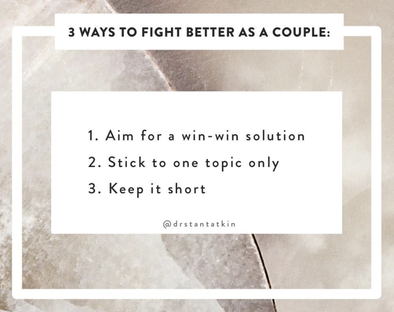
The most important thing to remember is that you “winning” an argument is not only bad for your partner but bad for you as well. How your partner feels walking away from a fight will affect your relationship moving forward.
- Aim for a resolution that will benefit you both. If you’re arguing for something that isn’t good for your partner as well, stop and come up with something that is.
- Keep the argument focused on a single topic. No two people can effectively manage more than one topic under stress.
- Finally, keep it short. This goes for what you’re saying and the argument length as a whole. Make sure you are brief enough to make sure your partner is also able to say what they need to say.
|
It is essential that if you or your partner cause distress in one another, you must quickly and effectively relieve that pain. If you’re in distress for too long, those bad feelings accrue and begin to mitigate the good ones. Over time, your physiology can orient toward a stress reaction every time you see or hear each other. Deal with issues like this right away in order to preserve the safety and security of your relationship. |
You’re more likely to be heard by your partner when you take care of yourself and your partner at the same time. Take care of only yourself, and you get nothing. Take care of only your partner, and you abandon your own needs and desires. If it doesn’t seem you have your partner’s best interests at heart, they will think they have to defend their interests themselves.
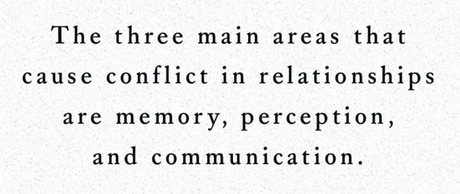
I call these the troublesome triad.
This triad, if not understood as intrinsic to the human condition, will lead to countless misunderstandings that you and your partner will presume to be intentional and personal.
So how can you avoid these misunderstandings? Be curious, not furious.
Check and cross-check your perceptions: what you hear, what you say, and what your partner hears.
Ask yourself: Are we talking about the same thing? Is my face saying something different from my words? Is my voice? Is the shortcut I’m using with my partner really being understood?
All of us can become arrogant about what we believe is true. The best way to error-correct is to remain curious, friendly, flexible, humble, and open to being wrong. Your relationship’s integrity is what keeps you safe and secure, not your adherence to fact, righteousness, or perfection.
This triad, if not understood as intrinsic to the human condition, will lead to countless misunderstandings that you and your partner will presume to be intentional and personal.
So how can you avoid these misunderstandings? Be curious, not furious.
Check and cross-check your perceptions: what you hear, what you say, and what your partner hears.
Ask yourself: Are we talking about the same thing? Is my face saying something different from my words? Is my voice? Is the shortcut I’m using with my partner really being understood?
All of us can become arrogant about what we believe is true. The best way to error-correct is to remain curious, friendly, flexible, humble, and open to being wrong. Your relationship’s integrity is what keeps you safe and secure, not your adherence to fact, righteousness, or perfection.
Devote yourself to your partner’s sense of safety and security and not simply to your idea about what that should be. What may make you feel safe and secure may not be what your partner requires from you. Your job is to know what matters to your partner and how to make them feel safe and secure.
Hesitating to share what’s on your mind increases the chance that your partner will misunderstand you. While your partner is waiting for you to speak, their brain is filling in the gaps with assumptions and because our brains have a negative bias, those assumptions likely aren’t good.
So be direct. Say what you want to say without padding the truth or beating around the bush. Not getting to the point right away will get you into a fight, especially when the two of you are in distress.
So be direct. Say what you want to say without padding the truth or beating around the bush. Not getting to the point right away will get you into a fight, especially when the two of you are in distress.
Use attraction to get what you want. I don’t mean physical attraction. Rather, I mean playfulness, seduction, persuasion, bargaining, cajolery, and enticement. The use of fear, threat, guilt, or shame will only breed acrimony between you and your partner.
|
Partners who lose faith in the fairness in their relationship may fall into the habit of bean counting – tracking who did what and when. This kind of constant vigilance will strain any relationship, let alone a romantic alliance.
If there’s a history of unfairness in your relationship, the attitude is more understandable, but you should work towards letting it go. Secure-functioning is supposed to free up resources, not tie them up. If you can’t trust the person you’re with, it’s worth examining why you are with them. |
|
Your ability to care for each other in moments of distress will determine the success or failure of your relationship.
Think of you and your partner as a two-person system with interdependent nervous systems that wire together like entangled ivy. Your actions will invariably have an effect on your partner. Learn to read each other and care for each other when emotional injuries occur. Otherwise, there can be a build up of perceived “threat” that will eventually increase your sensitivity to cues taken as menacing. This would make it more likely for you to make errors when appraising each other’s thoughts, feelings, and intentions. |
|
We all have deficits. In love, there are things that people do well, and things that people don’t do well. None of us are great at everything.
In relationships, deficits in the social emotional areas can show up. If you don’t know that you are not good at something, your partner won’t know either. Then your behavior may be viewed as purposeful and will lead to misunderstandings. That’s why it’s important to take a close look at what you are good at and what you are not so good at. Ask yourself, and maybe also ask your closest friends who you trust will give honest feedback. |
A couple’s principal function is to keep each other safe: from the outside world and each other. Think of your relationship as a survival team. Your lives depend on each other.
Your relationship will only be secure if we accept each other wholeheartedly. There’s no ideal partner. There’s only the perfectly imperfect. You both must take each other as is or not at all.
If you don’t or can’t accept your partner as they are right now, without cherry-picking the parts you like, you’re in trouble. Nobody signs up for a relationship because they want to be changed.
If you don’t or can’t accept your partner as they are right now, without cherry-picking the parts you like, you’re in trouble. Nobody signs up for a relationship because they want to be changed.
|
A mission statement can help you and your partner clarify your values and your expectations for each other. Spend some time drafting a statement together when you’re both relaxed and not rushed. Be open and honest with each other as you do this.
Here are some questions to help you get started:
It should be emotionally impactful, concise, simple, and memorable. |
What determines the success or failure of a romantic relationship isn’t common issues such as money, time, messiness, sex, or kids, nor is it about common interests, personality, or differences in age. It’s how you engage with those stressors as a couple that matters. How you work with each other, listen to each other, and calm each other makes the difference.
There’s no brain that’s good at everything. All of us have deficits. That’s just a fact. It’s a problem with ourselves if we don’t know about them. It’s a problem if we don’t accept them. It’s important you and your partner know each other’s deficits.
Beware of accruing injuries in your relationship. If you and your partner operate in a way that is unfair, unjust, or insensitive, injuries can build up. All of this can give rise to the biological threat system in the brain. The person who was once your lover, though not physically dangerous, begins to be viewed as a predator by the "primitive" part of your brain.
Nobody wants this in their relationship. That’s why it’s so important to deal with issues right away, aim for win-win solutions, and tend to each other’s emotional needs. Also, I must say I am talking about little "t" threat here - the type of threat that is normal and should be expected in any relationship, not big "T" Threat. If you are dealing with physical or emotional abuse from your partner, I implore you to seek help right away.
Nobody wants this in their relationship. That’s why it’s so important to deal with issues right away, aim for win-win solutions, and tend to each other’s emotional needs. Also, I must say I am talking about little "t" threat here - the type of threat that is normal and should be expected in any relationship, not big "T" Threat. If you are dealing with physical or emotional abuse from your partner, I implore you to seek help right away.
|
In the beginning of a relationship it can be easy to miss the parts of your partner that would otherwise bother you. When you’re feeling good, you finish each other’s sentences and feel like you’re of a single mind. In reality, though, we can only approximate another person’s mind - we can’t see the full picture.
You’re basically on drugs when you first meet. It’s nature’s way of ensuring procreation. Once nature’s drugs wear off, so does your tolerance for errors. It may feel as if your partner has changed, but it’s more likely that you’re only now starting to see the imperfect parts of them and that you’re more aware of the mistakes they make. |
|
Conflict is a part of being in a relationship. While I always say dealing with problems right away is important, that’s only part of the equation. How you navigate with your partner when arguments pop up matters.
I created this free 7-day guide to dive deeper into the best ways to resolve conflict in your relationship. 7 Days to Better Fights |
What do you and your partner both find joy in? A pet, favorite show, hobby, or anything else you both place your attention on can help amplify positive feelings in your relationship.
Figure out how you and your partner respond to threat. I mean small “t” threat here, not physical or severe “Threat.” We all respond in different ways. Use that knowledge to help care for your partner and vice-versa.
Do you tend to fight or flee? Do you freeze or collapse?
It's important for your partner to know this and how to get you out of this state or prevent you from getting there. Secure-functioning partners are good managers of each other. They are in each other's care, experts on each other, and caretakers.
Do you tend to fight or flee? Do you freeze or collapse?
It's important for your partner to know this and how to get you out of this state or prevent you from getting there. Secure-functioning partners are good managers of each other. They are in each other's care, experts on each other, and caretakers.

Simply aiming for “good for me” will wind up hurting you in the end, because it will wind up hurting your relationship. Instead, aim for a win-win solution in disagreements with your partner. If you notice that what you’re fighting for won’t benefit your partner in a meaningful way, rethink your position.

Most decisions we make are made using our implicit and procedural memory. This can affect who we are attracted to. We’re unaware of why exactly, but we like this person and don’t like that person. It’s just a “feeling” we have about them. What’s important to understand here is that we don’t choose to be with someone whom we perceive as too different from us and those who we've grown up around. Our automatic brain likes familiarity. We like some differences, novelty can be exciting, but if a person is too peculiar to us, we tend to move away from them.
That “feeling” you just can’t shake about someone is likely your automatic brain clocking some familiarity in the person you like. You’ll get that feeling even if on paper, they seem to be completely wrong for you.
That “feeling” you just can’t shake about someone is likely your automatic brain clocking some familiarity in the person you like. You’ll get that feeling even if on paper, they seem to be completely wrong for you.
Learn to take care of yourself and your partner at the same time.
|
I’m sure you’ve been with a couple that sucks the energy out of the room when they’re together. They throw each other under the bus, pull other people into their arguments, and take jabs at each other. It’s not only uncomfortable to be around, it chips away at the security of their relationship.
Secure-functioning couples protect each other in public. They have fun with their partner, not at the expense of their partner. Come up with simple agreements as a couple that will allow you to play well in public. These can be: - We will not disclose private information about each other. - We will always have each other's back. - We will save our arguments for times where we can be alone with each other. Are there any agreements you would add to this list? |
|
I hardly ever see people doing something to cause pain to their partner purposefully.
Many of the mistakes that partners make come because of the speed that our brains react. The automatic part of our brain is reacting very quickly to protect ourselves. This is great for our survival as a species, but gets us into trouble in our relationships. |
When we make a mistake, explaining our intentions won’t do much to fix the problem. Taking ownership, being specific in our apologies, and soothing our partners will do much more.
|
Our memory system is calibrated in such a way as to pick up negative experiences more than positive experiences. So, we’re more likely to remember when someone hurts our feelings than when someone does something nice for us.
Next time you find yourself fixating on everything your partner does that is hurtful, remind yourself to be mindful of the positive things your partner has done too. |
|
When we meet someone we’re attracted to we experience a drop in a neurochemical called serotonin. Serotonin is very good for managing anxiety and obsession.
So, why would we have a drop in serotonin? Well, if I meet you at a party, and you’re one of many people, what’s to keep me from forgetting you after I leave? The drop in serotonin helps you stand out from the crowd for me. I start to perseverate. I start to have all those obsessive thoughts: “Should I call?” “Will they text back?” “Did I say the wrong thing?” I start to think about you away from that first meeting. That gets me to come back to you. So those feelings of anxiety are a necessary part of pair-bonding. You might feel like you’re going to explode, but that’s all by design. 😉It gets better. |
Think of your relationship as the top of a hierarchy. You and your partner are royals.
Your needs come first, then come the needs of others in your lives. If you treat your relationship this way, you have a place from which to govern your life together.
Your needs come first, then come the needs of others in your lives. If you treat your relationship this way, you have a place from which to govern your life together.
|
Secure-functioning relationships are rooted in fairness, justice, and sensitivity for each other. Being in love is just the first step that got you together.
Now you have to decide to enter into a secure relationship. That involves coming up with principles that will govern your relationship, deciding that you both are equal partners, and taking care of your partner’s needs as you do with your own. |
There is certainly no replacement for traditional medication where needed, but relationships can play their own part in healing and have been shown to change our brains. Watch Video
If you’re in an argument, ask yourself if your position is not only good for you, but good for your partner as well. If it’s not, take a moment to rethink your position and try to come up with a win-win solution. If your partner wins, you win too.
|
Partners in a secure-functioning relationship are tethered together. A tether allows you the freedom to engage in your own activities, and then to always return to your partner for sharing and support. This tether can be as long or as short as you decide to make it.
A handcuff, does not allow for that kind of movement or flexibility—and approach that could be a recipe for disaster for a budding relationship. Imagine that you had to physically take your partner everywhere. That would be stifling, not secure functioning. And I assume you are more interested in the latter than the former. |
There is a deep freedom in commitment. When you and your partner decide to go all in on your relationship, you free up resources that would otherwise be spent worrying over the security of your relationship.
Create a morning ritual with your partner. This can be as simple as gazing into each other’s eyes as soon as you wake up or having breakfast together. Doing something together in the morning will help you launch each other into the day feeling secure and connected to each other.
|
We all process social-emotional material differently. The speed at which we process has nothing to do with intelligence. A slow-processing “tortoise” is no less intelligent than a fast-processing “hare.” However, if you are a hare that is partnered with a tortoise, you’ll have an unfair advantage on your partner in arguments. You will run circles around them and inevitably, they will lose every fight.
This is bad for both of you. For a relationship to be secure, you both need to be on an even footing. There’s nothing a tortoise can do to speed up, but as a hare, you can be sensitive to their position and slow yourself down. Give them a chance to express their point of view and beware of your tendency to drive the conversation forward before they’ve had a chance to chime in. |
There’s no need to fear arguing with your partner. You are different people. You’re bound to disagree and rub each other the wrong way at some point. The better you become at dealing with those problems as they occur, the more safe your relationship will feel.
I typically give this advice for arguments between partners, but it works no matter who* you’re in an argument with. While your impulse will likely be to look away, do your best to make eye contact. Your argument will be less likely to go off the rails if you can register exactly how you’re affecting the other person. * The only exception here is teenagers. They will not only hate you for making them sustain eye contact, but also for lecturing.
|
Secure-functioning relationships are based on fairness, justice, and sensitivity for one another. If one partner holds all the power in a relationship, it will be difficult for the other to feel safe and secure.
Love got you together, but it won’t automatically give you a secure-functioning relationship. You both have to make the choice to make your partnership secure.
We are not guaranteed secure-functioning relationships. In order to form a secure-functioning relationship, partners must make the decision to become both a “me” AND a “we.” They commit to becoming a survival team comprised of individuals with equal power.
|
Forgive yourself for making mistakes AND take responsibility for your actions.
|
When we’re under distress, the “primitive” parts of our brain take over and our ability to act rationally is inhibited.
This is one reason why it’s important to learn to read your partner well. If you notice they are slipping into distress when you’re in an argument, pause for a moment and try to relieve them. If you can do that, you’ll be more capable of moving forward and resolving your issues. |
We come up with agreements and principles for a relationship for the times when we don’t feel like following them.
|
Remember, when you’re arguing with your partner, you only win if your partner wins too. Try to stay friendly, use humor and relieve your partner if you’ve hurt them in a fight. Wave the flag of friendliness when you fight.
Try setting a limit of 15 minutes for a fight. If you don’t resolve the argument by then, aim to make everything ok for the moment and pickup the argument another time.
The longer you fight, the more stress you will put each other under. When we’re under this kind of stress, we lose the resources needed to properly process and think everything through. You’ll have a much better chance of resolving your issues if you limit how long you allow your fight to go on. |
Check in with your partner when you’re in the company of others. See how they’re doing and make sure they sense that you’re there for them.
If there's anything in your relationship that could be a deal-breaker, address it now. I know it can be scary to address issues that might affect the future of your relationship, but it's always better to do that earlier rather than later. Make sure you take it off the table completely, otherwise it could cause major problems down the road. Watch Video
|
It’s only when we enter a close relationship that we start to see all of someone’s complexities.
Often, when affairs start, it’s common for the one cheating to say that the new person is “so much easier” than their partner. It feels that way, because the relationship is new, but as time goes on, they’ll likely find that the new person is just as high-maintenance as the old. |
We are all learning as we go, and so much of what we need to know is dependent on the specifics of the person we’re with. You and your partner will have to train each other. Learn how your partner works and teach them how you work.
When we’re under stress, our ability to both take in words and formulate sentences becomes impaired. This is why it’s so important to slow down and keep it short when you’re in an argument.
|
Communication is difficult. We can approximate what’s in another person’s mind, but we can’t understand each other exactly.
That’s why it’s so important to put in the extra effort to make sure you are being understood AND that you are understanding your partner. Slow down and get as clear as you can with each other. |
If you’re looking for a partner, ask yourself what kind of relationship you want.
- Do you want a relationship based on radical loyalty?
- Do you want to be fully transparent with your partner?
- Do you want the relationship to come first?
- Do you want your relationship to be infused with playfulness?
A Harvard study started tracking men in 1938 in hopes of finding what contributes to a healthy and happy life. The study began to include the men’s children and then women in this longitudinal study.
What surprising factor did they find contributes to a long, healthy, and happy life?
Secure relationships.
The study found that the level of satisfaction with relationships in midlife proved more important than genetics for longevity.
This is no excuse not to exercise, but it’s a good reminder that our relationships (romantic and otherwise) should be a top priority. Watch TED Talk.
What surprising factor did they find contributes to a long, healthy, and happy life?
Secure relationships.
The study found that the level of satisfaction with relationships in midlife proved more important than genetics for longevity.
This is no excuse not to exercise, but it’s a good reminder that our relationships (romantic and otherwise) should be a top priority. Watch TED Talk.
People are flawed. People are disappointing. People make mistakes. None of that is a problem for a relationship, as long as both partners are willing to fix things.
Devote yourself to your partner’s sense of safety and security and not simply to your idea about what that should be. Your partner may need something different to feel safe and secure than you. Become an expert on what they need.
Ask yourself: what are 3-4 things that make your partner feel good about themselves?
We’ve all been taught to compromise when we reach a disagreement. The problem I have with this approach is that it implies that both sides will lose something.
Instead, I want to encourage you to bargain with your partner. When we bargain with someone, we try to give them something they want in return for what we want.
It’s much easier to reach a win-win solution when we take our partner’s needs into consideration.
Instead, I want to encourage you to bargain with your partner. When we bargain with someone, we try to give them something they want in return for what we want.
It’s much easier to reach a win-win solution when we take our partner’s needs into consideration.
We pick partners we recognize. They are similar to our close family or ourselves. If there’s a problem, it’s likely not with who we picked. It’s that we don’t know how to handle each other. Learning your attachment styles, fears, and sensitivities can help you better manage each other. Take attachment style quiz.
|
Pretend you’re a doctor about to give a kid a shot. If you spend too long telling them about getting the shot, they’ll build it up into this huge monstrous tragedy. If you do it quickly and then give them a lollipop, the pain turns out not to be that bad. Right?
Now think about telling your partner bad news. Your instinct might be to ease them into it (especially if you’re afraid there might be consequences for you), but remember the kid and the shot. It will be worse for them if you draw out sharing the news. Tell them quickly and then try to make them feel better... with or without a lollipop. |
You won’t be able to talk your partner out of what they want. Instead, search for a resolution to your problem that gives both of you something you want.
|
In the beginning of a relationship you’re basically on nature’s drugs. Nature doesn’t care about long-term relationships. It cares about procreation. Needless to say, you’re not thinking straight (for about a year). If you want to get clear on whether or not someone is right for you early on, try bringing them around your friends to get input. Social vetting like this isn’t something that tends to happen much anymore, but it’s a great way to get a clearer sense of someone (without the rose-tinted glasses).
|
|
We’re creatures of automation. It’s very likely you do the same thing over and over that bothers your partner. Instead of saying, "I won’t do that anymore,” get real and ask your partner to help you break the habit.
If you tend to get flustered in social situations and forget to introduce your partner, ask them to tap your shoulder as a reminder the next time you both run into someone they don’t know. We act reflexively, but if we have someone there to remind us, we’re able to be more mindful of our actions. |
How easily can you admit when you’re wrong?
|
The more cooperative and collaborative you are with your partner, the easier it will be to trust each other. You won’t feel the need to track every deed when you know your partner is looking out for your best interests too.
Secure-functioning partners know they are in each other’s care. They take care of each other in ways no one else would or could. What do you do for each other that nobody else would?
|
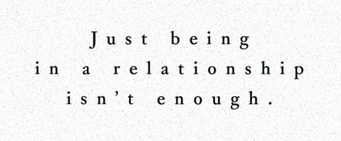
Secure-functioning relationships can make us physically healthier. However, the opposite is true if you’re in an unjust, unfair, or unsafe relationship. Just being with someone is not enough.
If one partner's needs always come above the other's needs, for example, that will erode the security of the relationship. The stress that comes from not having a primary relationship be secure can negatively impact your mental and physical health.
If one partner's needs always come above the other's needs, for example, that will erode the security of the relationship. The stress that comes from not having a primary relationship be secure can negatively impact your mental and physical health.
Handle problems in the moment so your partner has a fighting chance of recognizing and changing behaviors that hurt you. If you wait to bring something up, it’s very likely they won’t remember what they did.
Try this exercise with your partner to get better at reading how they are feeling.
Sit across from each other and relax your bodies. Keep your focus outward, except to occasionally sweep your body for areas of tension to relax. Keep your attention focused on your object of “meditation,” your partner’s face. Pay attention to any shifts you see in their facial muscles, coloring, eye movements, pupil size, and head movements. With every shift or change your notice, use your index finger to gently tap your thigh.
The first step to reading someone’s face is to notice tiny shifts and changes. Don’t interpret. Don’t read into changes. Just start with observation.
Sit across from each other and relax your bodies. Keep your focus outward, except to occasionally sweep your body for areas of tension to relax. Keep your attention focused on your object of “meditation,” your partner’s face. Pay attention to any shifts you see in their facial muscles, coloring, eye movements, pupil size, and head movements. With every shift or change your notice, use your index finger to gently tap your thigh.
The first step to reading someone’s face is to notice tiny shifts and changes. Don’t interpret. Don’t read into changes. Just start with observation.
We all have flaws. We are all difficult and annoying. No matter how long you look, you will never find a partner who is “perfect.” When you’re looking to form a committed relationship, ask yourself if you can accept all of who your partner is, especially the irritating parts. If you both can accept each other wholeheartedly, then you are perfect for each other.
|
Serious conversations and driving don’t mix well. If you’re talking about anything that might turn into an argument in the car, the conversation will likely get out of hand simply because you can’t make eye contact. When you can make eye contact with your partner, you’ll be able to notice if you’ve hurt them and quickly repair any damage.
|
Ending a relationship is never easy, but neither is staying in a relationship that isn’t secure. If there’s anything that threatens the security of your relationship, deal with it now. It’s possible the relationship may have to end, but if that’s the case it’s better that that happen now rather than kicking the can down the road.

Our brains already fill in the blanks in our memories by embellishing details. On top of that, whenever we remember something, we alter that memory again based on our current emotional state.
All of this is to say, we cannot hold onto our memories as if they are undisputed facts. It may feel as if they are, but I promise you, they are not. So the next time you and your partner are fighting over something that happened in the past, remember that you’re probably both wrong in some way.
All of this is to say, we cannot hold onto our memories as if they are undisputed facts. It may feel as if they are, but I promise you, they are not. So the next time you and your partner are fighting over something that happened in the past, remember that you’re probably both wrong in some way.
Your interests will shift or fade over time. Couples who stay together for the long term have something bigger that unites and binds them. Ideally, they are together because they want to become a thriving survival unit.
|
Thirds are other people, things, or activities that can draw one person’s attention at the cost of a relationship.
Secure-functioning couples put their relationship above everything else. That doesn’t mean they don’t have lives outside of their relationship, but they don’t allow “thirds” from taking priority over their relationship. |

It is possible, but I do recommend you work through infidelity issues with a couple therapist. The most I can give here is general advice.
Infidelity can be any serious betrayal of your agreements as a couple, not just an affair.
The worst kind of betrayal is the reveal of information that if previously known would have changed everything. That includes affairs, but can also be hidden bank accounts, having an STD, or any other serious cover-up.
For the one who was betrayed: Remember, if you wish to continue the relationship, you now have all the power to claim your terms for going forward. These relationships are pay to play. Don't surrender your role in calling the shots at this point.
For the one who did the betraying: I would recommend that you accept the position of having no power for the time being. You don't really have any leverage for now unless you're planning to leave the relationship. Is your partner complicit in some way? Possibly. But now is not the time to make that point.
Your partner will need time to heal (sometimes up to a year). That time can be shortened or lengthened depending upon your attitude and behavior. If you remain entirely open, transparent, patient, compassionate, and non-defensive, healing is much faster.
However, if you are defensive, not forthcoming, impatient, dismissive, angry, or indifferent, the process will definitely lengthen.
Your partner will likely show signs of PTSD: mood instability, sleep problems, obsessiveness, paranoia, perseveration, flashbacks, etc. This is not in their control.
My recommendation is that you take ownership over your new labels of "liar and cheater" and do not expect to be trusted or forgiven. Take it, learn, and grow. You will become a better person for having done that. If you both stick to your roles in this healing process, your relationship can be better than it ever was.
Infidelity can be any serious betrayal of your agreements as a couple, not just an affair.
The worst kind of betrayal is the reveal of information that if previously known would have changed everything. That includes affairs, but can also be hidden bank accounts, having an STD, or any other serious cover-up.
For the one who was betrayed: Remember, if you wish to continue the relationship, you now have all the power to claim your terms for going forward. These relationships are pay to play. Don't surrender your role in calling the shots at this point.
For the one who did the betraying: I would recommend that you accept the position of having no power for the time being. You don't really have any leverage for now unless you're planning to leave the relationship. Is your partner complicit in some way? Possibly. But now is not the time to make that point.
Your partner will need time to heal (sometimes up to a year). That time can be shortened or lengthened depending upon your attitude and behavior. If you remain entirely open, transparent, patient, compassionate, and non-defensive, healing is much faster.
However, if you are defensive, not forthcoming, impatient, dismissive, angry, or indifferent, the process will definitely lengthen.
Your partner will likely show signs of PTSD: mood instability, sleep problems, obsessiveness, paranoia, perseveration, flashbacks, etc. This is not in their control.
My recommendation is that you take ownership over your new labels of "liar and cheater" and do not expect to be trusted or forgiven. Take it, learn, and grow. You will become a better person for having done that. If you both stick to your roles in this healing process, your relationship can be better than it ever was.
When you hit a rough patch in your relationship, remember one thing: you chose each other for a reason. Check back in and ask yourself why you chose each other.
Our memories never match exactly what happened. Our brains fill in the gaps by making up or embellishing details. This is one reason why it's best to handle problems in the moment. If you wait too long, you'll both be arguing over memories that don't match up.
Brevity will go a long way in a fight. If you hold the stage for too long, the more likely you’ll rev up your partner. Do your best to be clear without going on too long and give your partner plenty of chances to talk.
|
Moments of intimacy can be especially important during transitions such as separation, reunion, going to sleep, or waking up. Sustained face-to-face and skin-to-skin contact can be really beneficial during these times.
|
Whenever you notice you’ve hurt your partner, tend to them them as quickly as possible.
|
|
The more you learn about your partner, the better off your relationship will be. Discover what excites them, what their fears are, and what makes them feel loved.
Are there words and phrases that trigger them? What soothes them when they are in pain? What are they self-conscious about? What makes them feel empowered? Ask yourself questions like these to fill out that “owner’s manual” and give yourself the information you need to be a better partner. |
|
Secure functioning partners do things for each other no one else would do. They are each other’s go-to. They tend to each other’s needs and insecurities. They accept each other fully… even when the other is being a pain in the ass. 😏And we can all be a pain in the ass sometimes.
|
Eye contact is a powerful connector. We tend to fall in love through the eyes–with our partners, children, even pets.
|
|
When I talk about attachment (islands, anchors and waves), I’m not talking about set personality styles. I'm talking about a memory system that anticipates particular threats when entering a close relationship.
It’s a flexible system. You might behave more like an anchor with certain people and a wave with others. Learning your attachment style is important so you can learn how to be with the partner you picked. You're going to feel more secure by understanding both your attachment syle and that of your partner. Understanding and taking ownership of your fears and concerns and that of your partner is what leads to secure functioning. |
|
We are all annoying and difficult. Being in a secure functioning relationship does mean accepting our partners just as they are. However, we should also do our best to be easy to get along with.
Examine how you are difficult and take responsibility for your own issues. You’ll certainly make mistakes from time to time, but the more aware you are, the less difficult you’ll be. |
Secure functioning partners have each other’s backs.
It's best to take your partner's side no matter what. If you must, give your notes and feedback to them later. Whether it’s a dispute between them and a family member, if others are having fun at the expense of your partner, or if it’s an issue between your partner and your friend.
Good things happen when you treat your partner's interests as seriously as your own.
It's best to take your partner's side no matter what. If you must, give your notes and feedback to them later. Whether it’s a dispute between them and a family member, if others are having fun at the expense of your partner, or if it’s an issue between your partner and your friend.
Good things happen when you treat your partner's interests as seriously as your own.
Your agreements as a couple should be to make your lives easier inside the relationship than it is in the world outside. The more clear you are with each other on your vision of the relationship and what will make it fair, the easier it will be.
How well do you know your partner's fears and sensitivities? The better you know your partner’s vulnerabilities, the better you’ll be able to care for them and avoid accidentally hurting them.
The strength of your relationship depends on how well you follow your agreements as a couple, how fair you are, and how well you take care of each other. It has nothing to do with how many vacations or date night photos show up on social media.
|
Tracking who did what and when is a sign of a lack of collaboration. Constant vigilance as to who is doing what chores, who is spending more, or who is giving more will strain a relationship.
If there is a history of unfairness in your relationship, this attitude is more understandable, but you'll eventually want to get to the point where this "bean counting" stops. Secure functioning partners trust each other and pursue fairness. This trust should allow you to free up resources, so you're not tied up trying to figure out who owes who. |
Being fully transparent with each other will make your relationship easier. Full transparency is less work and less stressful than keeping secrets.
Introducing novelty is a great way to bring vitality to your relationship. Instead of going to your favorite restaurant every date night, pick a new spot. If you always go to the movies, go to a museum this week. If you typically stay home, get out and hike together. Do something new and see how you feel after.
You and your partner are two separate people. No matter how close or similar you are, there will always be times when you want different things.
Tackle problems in the moment they occur. The longer you wait to address an issue, the harder it will be to deal with.
|
Our mouths can work much faster than our brains when we’re in a fight. We get upset, and the automatic part of our brain kicks in.
Before we know it, we’ve said a ton of hurtful things we don’t mean. So do your best to take a breath and slow down when you find yourself in an argument. Check in with your partner’s eyes and face. Make sure you understand what they’re saying and that they understand you. Slowing down and making eye contact will allow you both to regulate each other, so the fight doesn’t spin out of control. |
Try spending time eye gazing with your partner every day this week. Check in to see how it changes your mood and your feelings towards each other.
If you can, connect with each other before you head off into your day. Launching each other into the day will help foster a sense of connectedness between you and your partner.
Communication is harder than we think. We can never assume our partner understands exactly what we’re trying to say (or that we are truly understanding their meaning). Especially when dealing with serious topics, it’s worth slowing down and putting in the effort to be extra clear.
We pair bond with people we recognize. No matter how different you and your partner might seem at times, you are likely more similar than you think.
|
Humans are bad at multitasking under normal circumstances, but we’re especially bad at handling more than one thing at a time while we’re under stress. We become under-resourced and easily get confused.
A simple way to make your fights more productive is to agree to keep them to one topic. If anything else comes up, table it until you can fully focus on that issue. |
Fights are both inevitable and survivable. In fact, avoiding conflict will only make you appear more threatening to your partner. Instead of avoiding your next argument, try to go into the argument aiming for a solution that will work for both of you and do your best to be friendly to each other during the fight.
How often to you go out on dates with your partner? It can become easy to fall into our busy routines, but setting time aside to do something special together will help you maintain feelings of excitement and connectedness.
|
Do you shout hello from another room or do you make a point to get up and embrace each other?
Reuniting after work might not seem like a big deal, but physically greeting each other during that time can make a big difference in your relationship. When you take time to embrace, you allow your nervous systems to sync up and you foster a sense of security between the two of you. Be sure you look and sound happy to see your partner when reuniting in person or when on the phone. That first glimpse of 'happy to see you' sets the tone for all that follows. |
Do you know how to tend to your partner when they are hurt? What softens them? What feels threatening to them? The more you learn about each other’s sensitivities and needs, the better stewards you will be of each other.
|
When and your partner decide to go all in on a secure-functioning relationship together, you free up resources that would otherwise be spent on stressing over the security of your relationship. You will have more resources to focus on personal development and growth both inside and outside of your relationship.
|
We like to think that we’re logical, but the moment we’re put under pressure all of that rational thinking flies out the window. It takes a lot of resources to run our "ambassadors," the parts of our brain that are responsible for higher thinking. We rely on our "primitive brain" when we’re under stress, which runs automatically and doesn't operate logically.
|
We are visual animals. If we can’t check in with each other’s eyes, it becomes difficult to regulate each other’s emotions.
We can’t tell if we’ve done something to hurt the other person, we can easily misunderstand each other, and things can blow out of proportion very quickly when we’re not face to face. For this reason, I recommend forming an agreement with your partner that all serious topics be discussed when you are able to look each other in the eye. This means giving up text-wars, phone arguments, and fighting while driving. If you notice yourselves falling into one of those arguments, gently remind your partner of the agreement and plan to discuss the topic when you’re reunited. |
Hesitating to share what’s on your mind can increase the chance that your partner might misunderstand your meaning.
While you stumble with your words or use a preamble to get to the point, your partner is filling in the gaps. All of us have brains that tend to go negative in the absence of clear positive input. So chances are, your partner will begin to assume your point is a negative one before you can properly share what you think.
Do your best to keep it short and be direct with your partner. Share your thoughts without padding the truth or beating around the bush.
Doing so will help you steer clear of an avoidable fight.
While you stumble with your words or use a preamble to get to the point, your partner is filling in the gaps. All of us have brains that tend to go negative in the absence of clear positive input. So chances are, your partner will begin to assume your point is a negative one before you can properly share what you think.
Do your best to keep it short and be direct with your partner. Share your thoughts without padding the truth or beating around the bush.
Doing so will help you steer clear of an avoidable fight.
|
Secure-functioning couples protect each other from the outside world and themselves.
They are careful not to throw their partner under the bus in public, side with someone other than their partner, or reveal private information about their partner to others. They also take ownership of the ways in which they are responsible for each other’s well being. This means becoming an expert on each other’s sensitivities, learning how they can avoid injuring each other and how to quickly mend problems that arise. |
|
Become an expert on your partner. Learn their fears and sensitivities. Discover what makes them feel safe, what gives them joy, and what excites them.
The more you know about your partner, the easier it will be for you to bypass issues. You can begin to predict what they will perceive as threatening and you will learn the fastest ways to soothe them whenever they are hurt. |
We can get much further in life when we depend on someone else and allow them to depend on us.
|
|
Bargain with your partner and aim for a win-win solution whenever disagreements come up. Otherwise, resentments will build up and it will be more difficult to resolve the issue in the future.
If my partner wants to leave a party early, but I have friends that I want to stay and catch up with, I might offer to pick up the kids from school for them in exchange for staying a little longer. My partner might offer to do the dishes for the rest of the week in exchange for leaving early. We’ll bargain until we come to a solution that leaves us both happy. If I instead just said, “No. I want to stay and catch up with my friends,” my partner will resent me. I might get what I want in the moment, but I’d be hurting myself in the long run if they’re not happy. |
|
Convert your excitement over whatever you're interested in into something that is usable for your partner.
I might get really excited over every Game of Thrones development, but my wife, Tracey, isn’t much of a fan. Sharing my excitement with her will only really be interesting to her once. Instead, I can take my excitement and parlay it into something usable for her. I can express how much I love her when I’m feeling that excitement, which will create an amplification of our love. Doing so takes something that was a personal excitement and made it mutual. |
When you commit to someone, you free up resources that are otherwise spent trying to figure out whether or not you’re in or out. You’ll be able to be more creative, productive, and happy inside and outside of your relationship once you make a commitment to your partner.
This commitment doesn’t have to be marriage. It just has to be a commitment to stay in the relationship and follow a set of shared principles with your partner.
This commitment doesn’t have to be marriage. It just has to be a commitment to stay in the relationship and follow a set of shared principles with your partner.
Look for the best relationship for you. What is the relationship you need and want for the long run?
When you formulate this, put it in the “we.” “We tell each other everything. We have each other’s backs. When one of us is in distress, the other drops what they're doing to minister to them.” Then look for someone who will share that vision of a relationship with you.
When you formulate this, put it in the “we.” “We tell each other everything. We have each other’s backs. When one of us is in distress, the other drops what they're doing to minister to them.” Then look for someone who will share that vision of a relationship with you.
|
The longer you wait to apologize, the more you risk having your perceived indiscretion imprinted in your partner’s long-term memory. This can cause a simple problem to balloon into an ongoing issue.
When you know you’ve done something wrong, apologize immediately. Don’t wait to find the right words. Apologies don’t have to be eloquent – they just have to be said. |
You’re on "drugs" when you first meet. It’s nature’s way of making sure you reproduce, and nature only cares about doing that in the short term.
All of those feelings of obsession and lust will change once you get to know your partner better.
This is not to say that you cannot have feelings of exciting love in a long term relationship, though.
The more you pay attention to your partner, maintain eye contact, embrace, and seek out novelty together, the more exciting love will be a part of your relationship.
All of those feelings of obsession and lust will change once you get to know your partner better.
This is not to say that you cannot have feelings of exciting love in a long term relationship, though.
The more you pay attention to your partner, maintain eye contact, embrace, and seek out novelty together, the more exciting love will be a part of your relationship.
When I talk about secure-functioning relationships, I am not talking about love. I’m talking about safety and security. Secure-functioning relationships are fully collaborative, supportive, and based on fairness, justice, and sensitivity for each other.
|
SAY MORE THAN SORRY
"I'm sorry" won't get you far with your partner when you've done something wrong. Get specific and name exactly what you did.Pay attention for how they react and only go on when you see visible signs of relief. If you don't see relief, tell them you don't this is working and ask how to make it better. |
How do you show affection for your partner? Do you do something for them because they would want it or because it’s something you would want?
Part of becoming an expert on your partner is learning how they feel loved. Discover the actions your partner responds to. You may be spending all your money on gifts and flowers when what they really want is to spend quality time together. TAKE THE LOVE LANGUAGE QUIZ |
All of us want to be right, but being right isn’t as important as your relationship. Work on owning your mistakes and repairing them as quickly as possible.
|
Make love with the lights on from time to time. See if you can maintain eye contact. You don’t have to do this all the time, but see if it’s possible.
What happens when you maintain eye contact? Is it hard to think? It should be. You’re disconnecting the parts of the brain that chatter, plan, predict, and overthink. These brain areas use a lot of resources and will be difficult to run when you engage in something as stimulating as maintaining eye contact. Planning and predicting will only take you out of the present moment. You’ll only benefit from inhibiting your ability to overthink. |
Whether you’ve been apart for the day or you’re coming home from a trip, take time to embrace your partner when you reunite. Hold each other until you both relax your muscles.
It’s common for couples to get into fights after they’ve been apart for some time. Holding each other in this way when you greet will help you avoid such fights.
It’s common for couples to get into fights after they’ve been apart for some time. Holding each other in this way when you greet will help you avoid such fights.
Secure-functioning relationships last because they're based on more than just love. They're based on fairness, justice, and sensitivity for each other.
If you’re in a fight, you want to make sure you are as brief as possible and give your partner plenty of opportunities to talk. If you hold the stage for too long, you will only rev your partner up. Remember, you want to be collaborative with your partner.
I discourage texting anything serious to your partner because it can lead to misunderstandings and you will be unable to regulate your partner's emotions through the phone.
However, texting your partner throughout the day can be great. Text them when you have something funny or interesting to share. Text to let them know when you're thinking of them.
However, texting your partner throughout the day can be great. Text them when you have something funny or interesting to share. Text to let them know when you're thinking of them.
|
You’ll never know everything there is to know about another person. There will always be more to discover and those discoveries create excitement in a relationship.
In the beginning, it was all new and exciting. Over time, our brain starts to automate our partner. We stop paying attention, because we assume we already know everything about them. This is why I want to encourage you to become an expert in your partner. Experts in every profession continue learning throughout their lifetime. To be a true expert in your partner, you must do the same. Keep investigating. Keep paying attention. |
|
We can send back almost anything we buy, but don't treat your relationship like it came with a return shipping label.
Vetting our partners for the first year or two is fine. The problem is, if you continue auditioning your partner longer than that, you will harm the relationship. When we know we’re being judged, it’s impossible to behave normally. You won’t be able to see your partner’s true self until you take the risk of fully committing. This doesn’t mean marriage necessarily, but it does mean deciding that you are not going anywhere. |
The longer we are together, the more our brains will automate our partners. This will make your relationship feel easier, but it will also lead you to your first mistakes as a couple.
The best way to avoid that is to spend time paying attention to your partner. Tune out all distractions and just be with them. Try to discover something new about them. It may feel as if you know everything already, but I promise you, you don’t. Questions to get to know your partner.
The best way to avoid that is to spend time paying attention to your partner. Tune out all distractions and just be with them. Try to discover something new about them. It may feel as if you know everything already, but I promise you, you don’t. Questions to get to know your partner.
|
Secure-functioning couples don’t walk on eggshells with each other. If either of you believe the relationship can’t withstand your true selves, then by your own admission, it’s true.
Expose all of who you are to your partner and ask the same of them. If either of you is uncomfortable with the other person’s true self, it’s best you consider ending the relationship anyhow. Hiding from your partner is never a solution. |
|
No matter how close you are, no matter how much you know each other, you cannot expect to be on the same page all the time.
|
A secure-functioning relationship is a survival unit. No matter what life throws at you, your partner will be there to protect and heal you, as you will be there for them.
|
How do you show gratitude for your partner when they do something for you?
|
We always want to be available for our partners, but there are a few times when you absolutely must be there for them: - When your partner is sick
- When your partner is in the hospital or facing hearing news from a doctor
- When there’s a family funeral - During celebration or event for your partner
You can’t make up for being unavailable at times like these. Your partner will expect you to be there for them.
- When your partner is in the hospital or facing hearing news from a doctor
- When there’s a family funeral - During celebration or event for your partner
You can’t make up for being unavailable at times like these. Your partner will expect you to be there for them.
|
Keep your fights short. Get to the point and aim for a win-win solution. If you don’t get there within 15 minutes, agree to a pause and pick it up another time. When we’re under stress, we lose resources to think, process, and wait before reacting. The longer you let a fight go on, the more likely these problems will snowball. |
|
How often do you go on tangents in a fight? Sometimes we’ll bring up so many topics that it becomes impossible to remember what the original fight was about.
Get in the habit of only allowing one topic per fight. If anything else comes up, table it for another time. It's too difficult to keep track of multiple topics, especially when we're emotionally aroused. You'll only get yourself into trouble by piling more on. |
|
Are you planning on having a child with your partner? Make sure you discuss your expectations in advance and come to clear agreements on each other's responsibilities. Having clear guidelines will help you navigate parenthood while maintaining a secure-functioning relationship.
When I talk about putting the relationship before children, I don’t mean that the children won’t be taken care of. It’s about putting your oxygen masks on first so you can care for you children better. If you take care of the relationship first, you’ll be better resourced to handle whatever comes up with your kids. Plus, you’ll be modeling a secure-functioning relationship for them, which will only help them when they grow up. |
|
Without a sense of humor, your relationship will become rigid, overly serious, and brittle. However, if you can't stand each other's sense of humor, you're in trouble.
As an exercise, try to make your partner laugh. Try lots of different ways to get them to laugh. Explore their sense of humor and look for what they find funny. Figure out what they don’t find funny and what they find offensive. Find out if your partner is a producer of humor, an appreciator of humor or both. Don’t make jokes at your partner’s expense, joke about things that aren’t funny to your partner, or tickle them. |
When you begin a relationship, your new partner is a relative stranger for at least a year. Pretending otherwise can sabotage a potentially good relationship. Your courtship is basically an audition.
Of course, be yourself but understand that you have no special privileges with your new partner… yet. Let this “stranger” know who you are, including the parts you know are annoying, but reign in those annoying parts a little bit.
If you’re a distancer, for example, say so. If you’re someone who tends to cling, that may be good to announce fairly early too.
But telling someone something unattractive about yourself is different than acting out those unattractive or threatening behaviors.
Of course, be yourself but understand that you have no special privileges with your new partner… yet. Let this “stranger” know who you are, including the parts you know are annoying, but reign in those annoying parts a little bit.
If you’re a distancer, for example, say so. If you’re someone who tends to cling, that may be good to announce fairly early too.
But telling someone something unattractive about yourself is different than acting out those unattractive or threatening behaviors.
Remember, no one is perfect. You can only learn how to be a good partner by practicing, failing, and practicing again.
Stop judging your sex life according to what you see in the media or hear from friends.
Judge your sex life according to what you and your partner want. Are you meeting each other's needs? Do you have similar libidos? Do you enjoy sex with each other?
It doesn't matter if it feels like other people are having more or "better" sex than you. It's not a competition. Plus, your friends might not be telling the truth.
Judge your sex life according to what you and your partner want. Are you meeting each other's needs? Do you have similar libidos? Do you enjoy sex with each other?
It doesn't matter if it feels like other people are having more or "better" sex than you. It's not a competition. Plus, your friends might not be telling the truth.

Find time to travel or try a new activity with your partner this year. Experiencing something new with your partner can help amplify your love. You’ll both be forced to pay more attention, getting you out of your automatic brain and allowing you to be present with each other. You might just discover something new about your partner in the process.
|
I find that many people confuse codependency with interdependency. Codependency came out of AA. It’s meant to describe the partner who enables and supports the alcoholic’s addiction. A “codependent” focuses ALL their time and energy on their partner. It’s a one direction only relationship. There is no reciprocity.
What I advocate for is interdependency. Interdependency is a mutual agreement to support and protect each other. It works for both you and your partner. It’s not something to be scared of. In fact, by allowing yourself to depend on another person, you’ll be able to get much further in life. |
|
Have you ever had your partner say, “I don’t think you love me,” in the middle of a fight? Your impulse might be to say, “You know I love you” or “I’ve told you I love you.” Don't. Instead, look directly in their eyes and say very clearly, “I love you very much.” If anything comes up to threaten the safety and security of your relationship, take it off the table as rapidly as you can. |
|
It’s easy to assume you know everything there is to know about the person you’re with. It’s only our brain’s design that makes us think this way. After being with a partner for a while, our brain starts to automate them in the same way it automates the process for riding a bike.
This is great for energy conservation, but not so great in relationships. You can combat your automatic brain by spending time gazing at your partner’s eyes every day, hugging, and making an effort to figure out what’s going on with them in any given moment. |
|
I believe relationships do best when they come first, but I understand your priority might be your kids, your career, or something else. If that’s the case, make sure you’re clear with your partner and you both agree on that top priority. Otherwise, there will be trouble, because that priority will dictate all future decisions you and your partner make.
|
Whenever you can, save important conversations for when you’re face to face. You need to be eye to eye with your partner in order to regulate each other’s emotions. If you’re not, it’s much more likely that the conversation will escalate and get out of hand.
If you can’t be in the same room together, at least try to facetime instead of talking on the phone or god forbid, texting.
If you can’t be in the same room together, at least try to facetime instead of talking on the phone or god forbid, texting.
|
When you’re in a relationship, you’re in a two-person system. If your partner loses, you lose too. Make sure to remember that when you fight. “Winning” an argument at the expense of your partner will hurt you as much as it hurts them.
|
Spend time holding your partner every day. It’s one of the easiest ways to improve your relationship.
|
|
We are animals that function optimally by regulating our nervous systems (and emotions) interactively with others. We co-manage each other's emotional states primarily through touch, vision, and sound, in that order. Though touch has great power to down- and up-regulate another person, eye contact comes in a very close second. Indeed, when it comes to finding and being found, the eyes have it.
When we gaze at our partner (or baby or dog, for that matter), we are in real time. By gazing I don’t mean staring or looking through or looking inward; by gazing I mean being fully present in the eyes of our loved one. If we maintain presence—something our partner can see—we also become anchored in real time, in the present moment. If we look into our partner’s eyes, we can see him or her think, feel, and change before us. |
|
Being fully transparent is less work and less stress than keeping secrets.
|
Do you love your partner for all of who they are?
There is no perfect partner. I’m not saying you have to see your partner as perfect. They will have flaws. They will annoy you. They will make you angry. You’ll do the same for them. Secure-functioning couples accept each other’s flaws as a part of the package, rather than trying to change each other. |
How well do you and your partner get along in public? We all know that couple who throws each other under the bus, takes jabs at each other, and sucks the energy out of the room.
Secure-functioning couples protect each other in public. They have fun with their partner, not at the expense of their partner.
Come up with simple agreements as a couple that will allow you to play well in public. These can be: - We will not disclose private information about each other.
- We will always have each other's back.
- We will save our arguments for times where we can be alone with each other.
Secure-functioning couples protect each other in public. They have fun with their partner, not at the expense of their partner.
Come up with simple agreements as a couple that will allow you to play well in public. These can be: - We will not disclose private information about each other.
- We will always have each other's back.
- We will save our arguments for times where we can be alone with each other.
|
You can’t learn how to be a good partner in a cave. You can only learn this through practice. You have to learn and fail and learn again.
If you wait until you “love yourself” before allowing yourself to fall in love, you’ll never feel ready to start a relationship. We learn to love ourselves by loving another person. Self and other have always been intertwined, since we were babies. |

We are wired for connection. Our culture may value independence and self-reliance, but we can get much further when we depend on someone else and allow them to depend on us. I don’t mean that we have to be in romantic relationships. Good friendships and loving families can also greatly benefit us. What’s important is that we allow ourselves to be connected to others.
A great way to amplify your love is to find a shared object or interest that both of you can put your attention on. It can be a dog, a hobby, a child, a favorite show – anything you both love can help you grow your feelings of love for each other.
|
Looking for a gift for a couple in your life? My new book, We Do, is perfect for couples who want to know how to foster a loving long-term relationship.
It’s filled with practical advice and exercises like this one which helps partners become better collaborators: “You and your partner should stand several feet away from each other. One of you is the beckoner and the other is being beckoned. Face each other and follow these rules: - The beckoner must get the other person to come to them. - Neither partner can talk. - The beckoner can do anything except go get the partner. The partner must be beckoned. - The beckoned partner moves only if really persuaded, not because they feel sorry for the beckoning partner. Notice how long it takes for your partner to come to you. What made the beckoned partner move? What didn’t work? Did the beckoner become frustrated? Did the beckoner appear attractive to the other partner? Did the beckoner use anything that could be interpreted as fear, threat, guilt, or shame? Did the beckoner feel comfortable beckoning? Did they look comfortable? Now do the exercise again with partners playing the same roles, only this time the beckoner must use a different tactic. Again, what worked, what didn’t, and why? Switch partners and do this again. “ |
Verbal communication gets us into trouble, because we forget we’re not really being understood or understanding what our partner is saying.
When you were dating, I bet you were much more clear. You wanted to make sure that this virtual stranger knew exactly what you meant. How clear are you now?
Because we operate by memory, we start to think we know everything about our partners and they know everything about us. We begin to assume understanding. This is what gets us into trouble.
Just as you need to make sure you are fully listening to each other, you need to be sure you are actually being clear and have each other’s attention.
When you were dating, I bet you were much more clear. You wanted to make sure that this virtual stranger knew exactly what you meant. How clear are you now?
Because we operate by memory, we start to think we know everything about our partners and they know everything about us. We begin to assume understanding. This is what gets us into trouble.
Just as you need to make sure you are fully listening to each other, you need to be sure you are actually being clear and have each other’s attention.
|
You and your partner will have problems. It’s inevitable. Dealing with another person is hard work, but it’s worth it. Don’t compare your relationship to others; because I can guarantee you they have their own problems too. No matter whom you’re with, there will be problems.
|
One of the core tenets of a secure-functioning relationship is to accept each other as you are, flaws and all.
|
|
Have you ever found yourself in the middle of a fight and realized you’re saying things you don’t even mean?
Slow down. Take time to look your partner in the eye when you’re in an argument. Make sure you’re understanding what they’re actually trying to say, and vice versa. This way, you’ll be able to regulate each other, and it will be less likely for the fight to spin out of control. |
|
It’s common to underestimate how much effort we need to put into our relationships. In our careers, the path to success can be clearly laid out for us. It’s not so easy in our relationship. Put as much into your relationship as you do for your career.
|
Studies show that when we have less choices, we’re actually happier. This is the case for everything from picking a place to eat to finding a partner.
|
|
Look at your partner realistically, not idealistically. You both are perfectly imperfect. As a partner in a secure-functioning relationship, you are vowing to do things for your partner that you couldn’t be paid to do for anyone else. Their pain is yours to soothe. Their fears are yours to assuage. They are your burden to bear… and love.
|
|
Anyone can seem low-maintenance at a distance. All of us, though, are unpredictable, needy, and sensitive. The more you get to know and invest in a person, the more you'll see their high-maintenance side.
When you’re dating, let go of the urge to find that perfect “chill” partner. They don’t exist. |
Secure-functioning has nothing to do with the affectionate feeling of love. It’s about safety and security. Secure-functioning couples support, protect, encourage, and care for each other.
When you decide to commit to each other for the long term, forge agreements together. Come up with a list of values and principles you want to uphold as a couple. "We vow to put the relationship first. We tell each other everything. We have each other’s back in private and in public. We are the first to know things."
Make your vows to each other a declaration of what you are together, not just what you vow to do as an individual. You can find more tips on how to create a long-lasting and happy marriage in my new book, We Do.
Make your vows to each other a declaration of what you are together, not just what you vow to do as an individual. You can find more tips on how to create a long-lasting and happy marriage in my new book, We Do.
Are you able to just be and enjoy each other without having to do anything? Quiet love is as important as the exciting love you feel at the beginning of a relationship.


